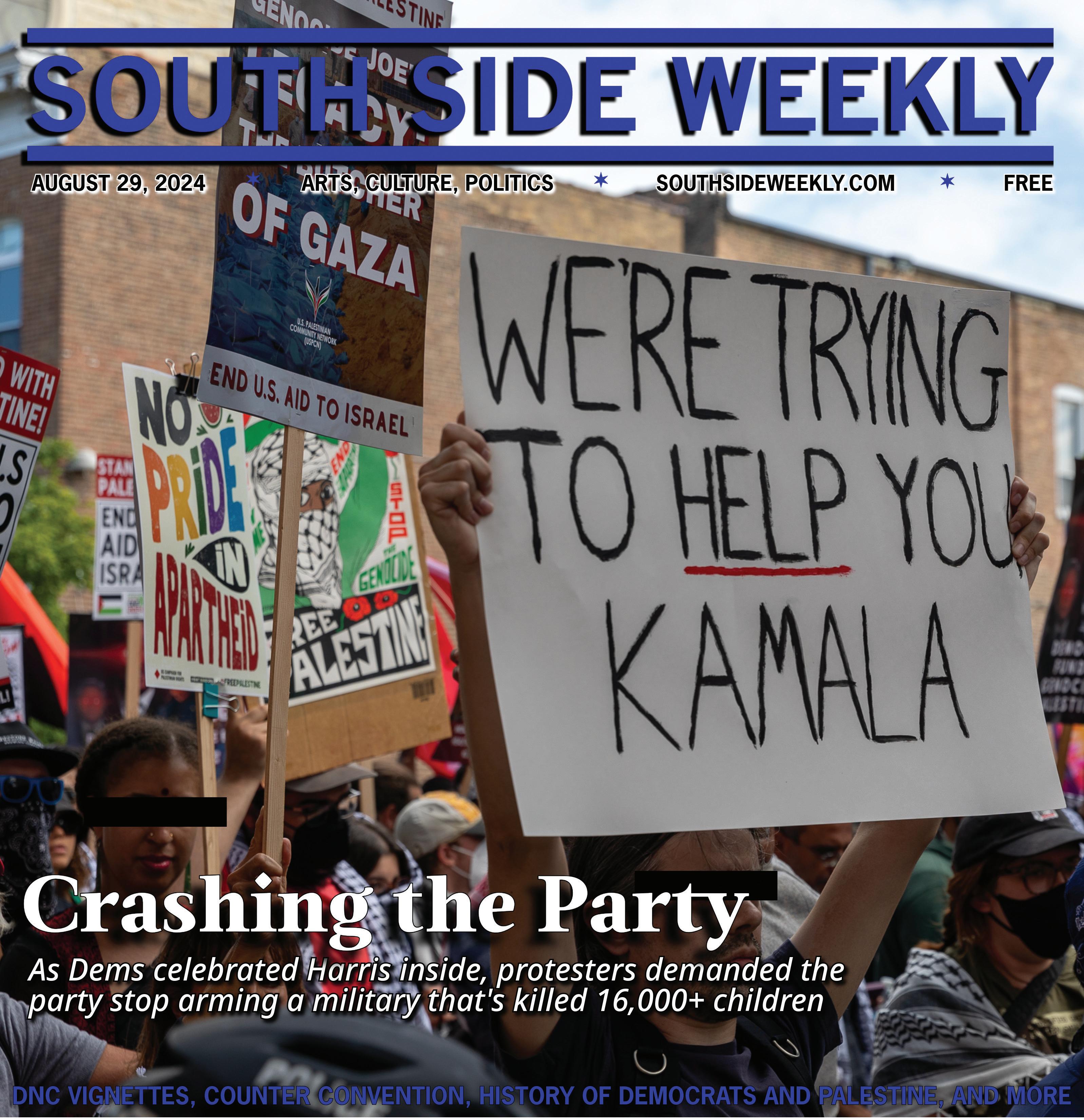

Public Meetings Report
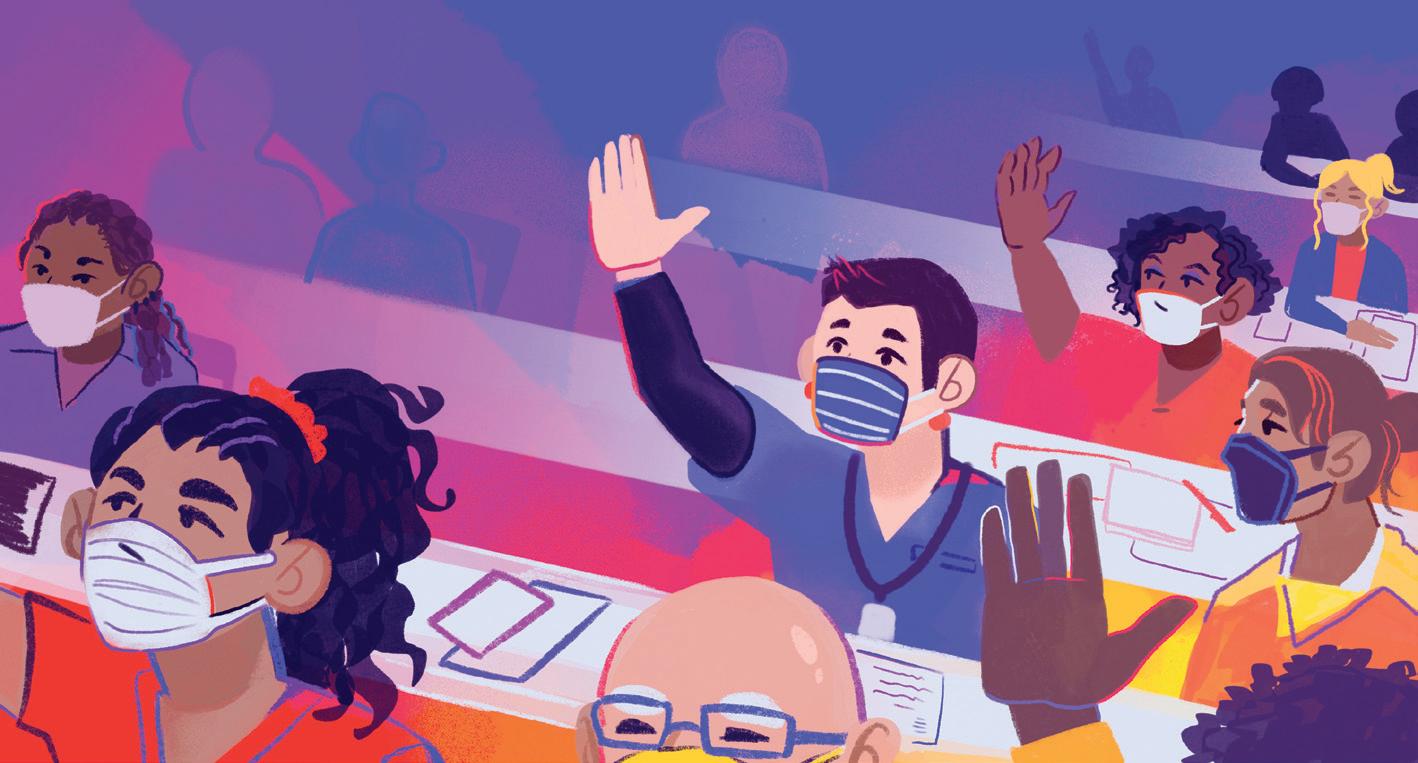
A recap of select open meetings at the local, county, and state level.
BY SCOTT PEMBERTON AND DOCUMENTERS
August 6
A meeting of the 1st Police District Council—Downtown/South Loop/Near South Side was shorter than expected because the scheduled guest speakers—staff from the Democratic National Convention (DNC)—were not present. The 1st Police District Council, which covers parts of the Loop to the Near South Side and spans seven different aldermanic wards, saw most of the DNC traffic Aug. 19 to Aug. 22, with daytime programming at McCormick Place and evening events at the United Center. The Council encouraged community members to attend DNC security meetings on August 7 and warned that traffic and parking would be heavily restricted. According to the municipal code, each of the twenty-two district councils fulfills several roles, including “building stronger connections between the police and the community,” collaborating to develop local policing initiatives and to implement them, and conducting monthly meetings open to the public. Residents of each district elect the three members serving on each of the councils every four years.
August 8
At their meeting the Metropolitan Water Reclamation District of Greater Chicago Board of Commissioners heard about how amendments to stormwater regulations could affect flooding and contamination of rivers in the Chicago area. Tessa Murray, watershed policy manager for Friends of the Chicago River, spoke to several amendments of the Watershed Management Ordinance proposed in May. Murray said amendments made to the volume control requirements, which apply to the management of stormwater, could negatively impact areas prone to flooding and create an environment in which toxic stormwater could contaminate the Chicago and Calumet rivers. Murray spoke in favor of an amendment that expands protections for “riparian zones,” which border bodies of water and drainage areas: “With climate change, extreme storms and flooding are only becoming more common in the region, and the purpose of the Watershed Management Ordinance [WMO] is to protect our communities…We believe the district’s WMO should be strengthened over time, not weakened.” The nine commissioners serve six-year terms. Three are elected at large every two years.
August 10
During their meeting, members of the 10th Police District Council—Little Village/ North Lawndale/Heart of Chicago stressed the need for de-escalation and anti-violence work amid a rise in shootings in the community. Residents of the district recently held a prayer vigil for a three-month-old baby and a twenty-one-year-old man who were in critical condition after being injured in a drive-by shooting last month. Council members called for an expansion of community-based de-escalation programs, including the
Flatlining Violence Inspires Peace (FLIP) program. FLIP hires and trains residents who might be impacted by gun violence in how to de-escalate potentially violent situations.
August 14
At a meeting of the Chicago Transit Board, CTA President Dorval Carter assured members and attendees that the CTA would be prepared to meet transportation needs related to the Democratic National Convention at the United Center. “We will be ready to put on the best face of public transportation for the entire country,” Carter said. Completion of the Damen Green Line stop had been fast-tracked to meet convention travel demands. He then switched gears to discuss the 5.6-mile Red Line Extension project. Carter said he rode the bus as a child and had been hearing about plans to extend the Red Line his whole life (the 95th/Dan Ryan terminus opened in 1969). Attendees praised the project as “transformative.” Plans call for four new stations to be added and extend south to 130th Street. Connections at the stations will offer bus, bike, pedestrian, and park-and-ride facilities.
Panelists and attendees at a special hearing of the Community Commission for Public Safety and Accountability (CCPSA) discussed the need for a City office to support neighborhood-based initiatives to prevent gun violence. During public comment, several people involved with Giving Others Dreams (G.O.D.), spoke in favor of gun violence prevention. G.O.D. is an organization that provides re-entry and support services to women and families impacted by violence and the legal justice system. Former Chicago Police Superintendent Eddie Johnson spoke on behalf of ShotSpotter, saying it was “mind-boggling” that the City would try to reduce violence without using the controversial gunshot detection technology. A City Council ordinance enacted in July 2021 created the CCPSA and district councils. The CCPSA is charged with systemic reform, and the goals of the elected district council members are to improve policing and public safety within their districts.
August 15
In anticipation of a “temporary increase in complaints” during the Democratic National Convention, the Civilian Office of Police Accountability (COPA) launched a special dashboard for DNC-related police misconduct allegations, the Chicago Police Board learned at its meeting. The board is “an independent civilian body that decides disciplinary cases” involving Chicago police, according to the board’s website. As of press time, the dashboard showed that eight complaints had been logged during the DNC. Witnesses to alleged police misconduct would be able to email photo, video, or other evidence to DNC-COPA@ChicagoCOPA.org. COPA does not have jurisdiction over non-Chicago law enforcement (such as the officers from Wisconsin). It has stated that it will direct other complaints to the appropriate oversight entities. Several public commenters called for justice for twenty-four-year-old Reginald Clay, Jr., who was shot by a police officer during a foot chase on April 15, 2023.
During a meeting of the Chicago Plan Commission, Anton Seals, executive director of Grow Greater Englewood, said a plan to guide development around the Englewood Nature Trail will be successful if the neighborhood remains affordable and the life expectancy gap between area residents and those in wealthier parts of the city decreases. Known as the Englewood Agro-Eco District Land Use Plan, the development guide was released just this month. A 2019 New York University study that explored life expectancy and racial segregation in major cities ranked Chicago among the top offenders, Seals said. The Commission voted to adopt the plan, along with development proposals from Sunshine Community Development Corporation in Woodlawn and a compost facility linked to Urban Growers Collective in Auburn Gresham. The Chicago Plan Commission is responsible for reviewing proposed public lands sales and acquisitions and some long-range community plans. More specifically, the Commission considers proposals involving planned developments (PDs), the Lakefront Protection Ordinance, planned manufacturing districts (PMDs), and industrial corridors and tax increment financing (TIF) districts.
This information was collected and curated by the Weekly in large part using reporting from City Bureau’s Documenters at documenters.org.
illustration by Holley Appold/South Side Weekly
SOUTH
SIDE WEEKLY IN CHICAGO
The South Side Weekly is an independent non-profit newspaper by and for the South Side of Chicago. We provide high-quality, critical arts and public interest coverage, and equip and develop journalists, artists, photographers, and mediamakers of all backgrounds.
Volume 11, Issue 16
Editor-in-Chief Jacqueline Serrato
Managing Editor Adam Przybyl
Investigations Editor Jim Daley
Senior Editors Martha Bayne
Christopher Good Olivia Stovicek
Sam Stecklow Alma Campos
Politics Editor J. Patrick Patterson
Music Editor Jocelyn Martínez-Rosales
Immigration Editor Wendy Wei
Community Builder Chima Ikoro
Public Meetings Editor Scott Pemberton
Visuals Editor Kayla Bickham
Deputy Visuals Editor Shane Tolentino
Staff Illustrators Mell Montezuma Shane Tolentino
Staff Reporter Michael Liptrot
Director of Fact Checking: Savannah Hugueley
Fact Checkers: Patrick Edwards
Arieon Whittsey
Christopher Good Mo Dunne
Layout Editor Tony Zralka
Executive Director Malik Jackson
Office Manager Mary Leonard
Advertising Manager Susan Malone
Webmaster Pat Sier
The Weekly publishes online weekly and in print every other Thursday. We seek contributions from all over the city.
Send submissions, story ideas, comments, or questions to editor@southsideweekly.com or mail to:
South Side Weekly
6100 S. Blackstone Ave. Chicago, IL 60637
For advertising inquiries, please contact: Susan Malone (773) 358-3129 or email: malone@southsideweekly.com
For general inquiries, please call: (773) 643-8533
Publication schedule
Hey readers, we’re taking a short break from print issues—our next one won’t be until September 26, which will be our Best of the South Side issue. After that, we’ll return with the regular bi-weekly schedule on October 10. In the meantime we’ll still be publishing stories online, so be sure to check us out at southsideweekly.com and on Instagram, Facebook, and Twitter.
Removal of free and alternative press during convention
On August 19, the first day of the DNC, the City of Chicago began the removal of dozens of newsracks from downtown, which distribute a range of free and alternative print media, including the South Side Weekly, the Chicago Reader, and La Raza. We became aware of the situation after the Newcity publisher, who hadn't been informed about the move either, reached out to the vendor, JCDecaux, and then to fellow outlets. JCDecaux said that its contract with the City meant that they had to follow City directives, which ordered the permanent dismount of eighty-three newsracks, and that it was not their decision. JCD added that they were “under the impression [news outlets] were made aware by the City, before they instructed us to start with the dismounts.” Despite social media backlash, Alderman Bill Conway, of the 34th Ward that includes the South and West Loop, tweeted that he was “glad to work with Streets and Sanitation to remove these dilapidated news racks, which were underutilized and had become unsanitary due to misuse. Time for them to go.” However, recent photos of the sidewalk multiracks (such as those on Randolph) showed that they were neither dilapidated nor unsanitary. A mayoral spokesperson told the Weekly that “the decision to remove the multiple news racks was made based on the public health and safety risks, as well as their deteriorating condition and limited use in locations where news racks have been removed. Publications are free to use individual news racks, provided they comply with the general size, weight, placement, and aesthetic restrictions” per the city code.
Riot Fest is back in Douglass Park
In mid-August, Riot Fest and city officials announced that the punk rock festival would be taking place in Douglass Park in September after all. The festival, which first moved to Douglass Park in 2015 after being ousted from Humboldt Park by angry residents, has faced growing pressure from North Lawndale and Little Village residents unhappy about their park being blocked off for weeks each fall. In June, festival organizers said they were leaving Douglass Park and moving to SeatGeek Stadium in Bridgeview, pinning the blame on the Park District for not cooperating throughout the permit process.
In the new arrangement, Riot Fest will send 10 percent of its revenue from the festival to go toward maintenance and improvements of the park itself, as part of guidelines under the Park District’s new Park Enhancement Fund. It’s unclear if that’s separate from the funds that will be needed to clean and repair the park afterwards. It’s also unclear whether local residents will be able to score free tickets—usually the days to get those take place earlier in the summer.
The move apparently came after festival founder Mike Petryshyn met with Mayor Brandon Johnson about the possibility of keeping Riot Fest in Chicago. Alderwoman Monique Scott (24th), whose ward oversees the park, has also been a supporter of Riot Fest staying in Douglass Park. Residents opposed to Riot Fest plan to attend upcoming Park District Board meetings to voice their demands.
The festival will take place September 20-22, though the south part of Douglass Park will be closed off for days or weeks ahead of and after those dates. Headliners will be Pavement, Beck, Slayer, and Fall Out Boy, and the festival will also include performances by Tierra Whack, Taking Back Sunday, St. Vincent, Sublime, and many others.
IN THIS ISSUE
despite harris’s nomination, some dem voters remain uncommitted
Other voters who wrote in primary votes protesting Biden’s support of Israel are reconsidering now that the Vice President is topping the ticket. max blaisdell .......................................... 4 investments in “third spaces” spotlight community arts initiatives
Next Stop: Chicago provides grant funding to creative organizations on Chicago’s South and West Sides ahead of the Democratic National Convention. jasmine barnes
7 pomp, pageantry and protests on dnc’s final night
A-list actors, musicians, civil rights leaders, and Vice President Kamala Harris brought the crowd to its feet countless times.
alma campos
8 fiestas, espectáculos y protestas en la noche final de la convención demócrata Actores de primera fila, músicos, líderes de los derechos civiles y la Vicepresidenta Kamala Harris pusieron al público en pie en innumerables ocasiones. por alma campos ..................................... 9 cpd document sheds light on dnc security plan
The out-of-town officers were housed in a University of Chicago dormitory in Woodlawn. jim daley, max blaisdell 10 obamas’ hope message contrasts with protests over south shore displacement, gaza Michelle and Barack Obama gave speeches last Tuesday evening at the DNC. tonia hill, the triibe
11 the world keeps watching in medium cool
A 1969 movie filmed and set during the infamous ‘68 DNC was eerily prescient about the role of media in desensitizing us to violence.
savannah ray hugueley
12 dozens of arrests at pro-palestine protests during dnc
Multiple marches, an Israeli consulate demonstration, and sit-ins outside the United Center took place. max blaisdell
14
federal lawsuit alleges chicago police beat migrants seeking work at home depot
Criminal trespassing arrests have skyrocketed at a Southwest Side Home Depot as recently arrived migrants seek work.
sebastián hidalgo, city bureau ............. 17 jamila woods, ric wilson headline concert for ceasefire in gaza ahead of dnc
‘No Weapons, No War, No Genocide’ debuted ahead of the DNC to an intimate in-studio audience and an online crowd of hundreds.
jocelyn martinez-rosales ..................... 22 kamala harris closes dnc following week of celebration, protests and trump attacks
The Vice President’s speech focused on her upbringing and stressed unity, but lacked many platform details. michael liptrot 22 forty years of “democrats for palestine” continues to confront familiar repression
Treatment of the issue at DNC 2024 leaves lifelong Democrats re-evaluating their strategy for Palestinian liberation.
wendy wei 23
dnc counter-convention amplifies voices of resistance
“F*** The GNC” centered pro-Palestine movement with a week of programming and urgent calls for action.
jocelyn martinez-rosales ................... 27
Cover photo by Jesus Montero
Despite Harris’s Nomination, Some Dem Voters Remain Uncommitted
Other voters who wrote in primary votes protesting Biden’s support of Israel are reconsidering now that the Vice President is topping the ticket.
BY MAX BLAISDELL
The elevation of Vice President Kamala Harris to the top of the Democratic Party’s presidential ticket has energized key coalitions within the party’s base, including Black, Latinx, and female voters.
However, Harris’s candidacy has not been universally embraced by Arab Americans and progressive voters on the South Side, many of whom are incensed by the administration’s support for Israel’s ground invasion and bombing campaign in Gaza. As with President Joseph Biden during the 2024 primary, some voters are saying they won’t cast a vote for Harris.
Fahad Sajid is a thirty-four-yearold Pakistani American who lives in Hyde Park. After Harris became the presumptive Democratic nominee, he told the Weekly nothing has changed in terms of how he’ll vote. Sajid, who identifies as a social democrat, expressed concerns about Harris’s track record on foreign policy, specifically regarding Israel and Palestine.
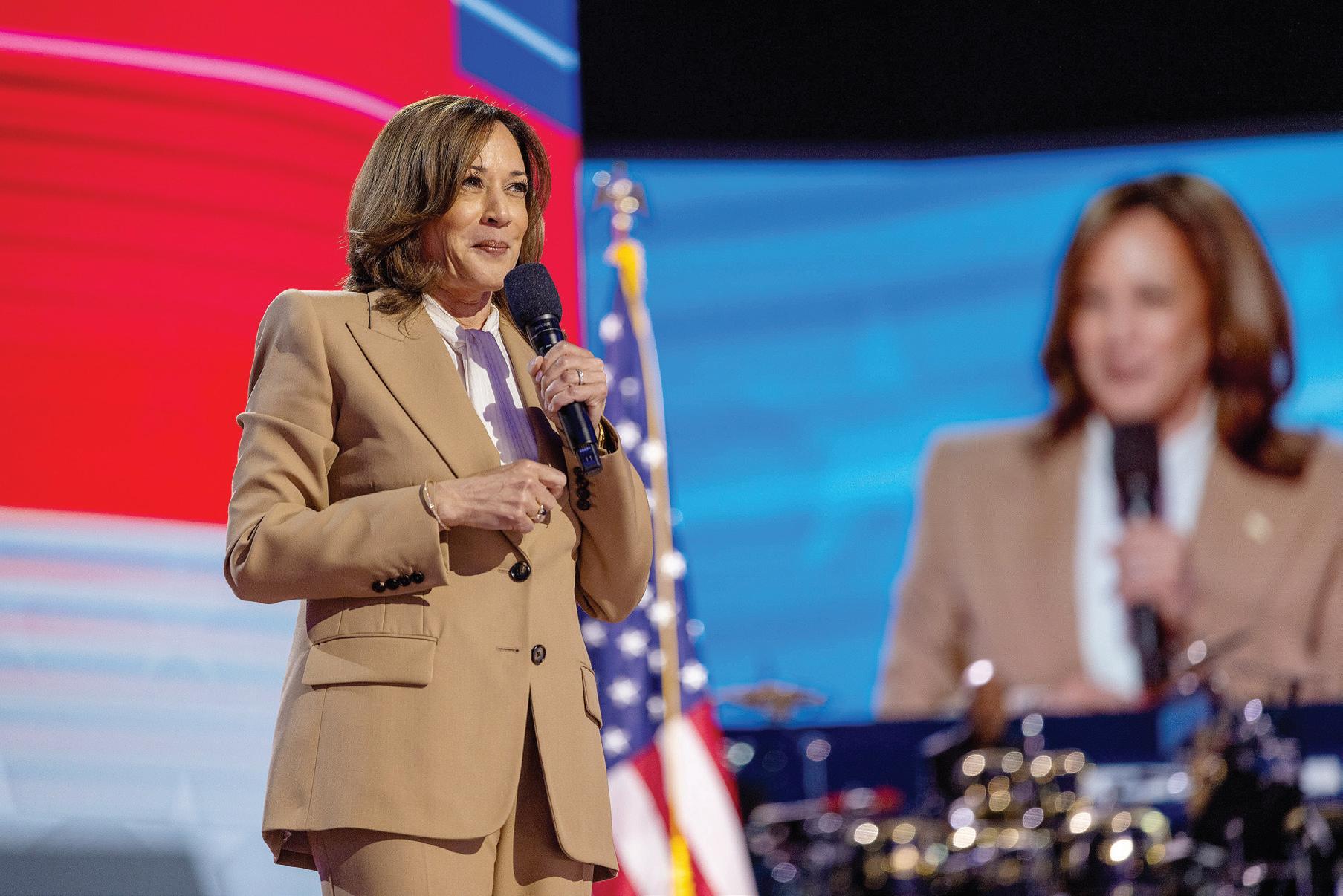
“Kamala Harris was part of the administration that enabled the ethnic cleansing of Palestinians in Gaza, and there is no indication that a Harris administration would be any different,” he said.
While Harris has expressed some empathy for the plight of the Palestinians, saying at a recent campaign event that “far too many” Palestinians have been killed, she also defended Israel’s right to “go after Hamas.” To date, more than 40,000 Palestinians have died in the conflict, according to the Gaza Ministry of Health.
Sajid, who also took part in the campus protests at the University of Chicago this spring, puts little stock in the argument that Harris might be more susceptible to pressure from the left than a Trump administration.
“Voting for the Democratic Party means giving them carte blanche. It does not hold [them] accountable,” he said. “Voters of conscience need to—even if it means losing an election or two—need to make themselves heard, need to make
their power felt, and need to bring the Democratic Party back to the left and in line with real progressive values.”
Sajid plans to vote for Jill Stein, the Green Party candidate who has pledged to demand a ceasefire in Gaza and end all military aid to Israel. According to Al Jazeera, she is considering adding an Arab American as her running mate.
Sajid said voting for Stein is not only the morally right choice but also a strategic move aimed at breaking the
two-party system and pushing for more radical change.
“This country keeps moving more and more rightward, and we’re going down the path of fascism,” he said. “The only way to stop [that] is to have alternatives, is to have choice, is to actually make the electoral system and the parties more competitive.”
A poll conducted by Marquette University Law School earlier this month shows that Stein is the choice of about only 2 percent of voters nationally, so her candidacy is a long-shot bid. As in 2016, however, she could play spoiler to Democrats in certain crucial swing states.
Several progressive activists who attended a recent court hearing about the route of a planned protest march during the Democratic National Convention (DNC) said they wouldn’t vote for the Democratic ticket absent an immediate ceasefire in Gaza and an end to the occupation of the West Bank.
“If the policies don’t change, my vote won’t change,” said Andres Guzman, who lives in Pilsen and wrote in “Gaza” on his March Democratic primary ballot to protest the Biden Administration’s aid shipments to Israel. “As long as the policy says ‘murder more Palestinians,’ I’ll still vote [for] Gaza, not Democrat.”
Dod McColgan, an organizer with the Chicago Alliance Against Racism and Political Repression (CAARPR), said that as long as “our tax dollars are going to fund the war,” activists need to use “every means available” to press for a ceasefire. “We’ll protest at the DNC, and we’ll protest at the ballot box,” McColgan
Vice President Kamala Harris made a surprise appearance on the first day of the Democratic National Convention.
Photo by Michael DiGioia
said.
While Illinois is a blue stronghold, “uncommitted” voters could influence outcomes in nearby battleground states, such as Minnesota and Michigan. In those states, more than 150,000 Democrats voted “Uncommitted” in the spring presidential primaries to protest the Biden administration’s military aid to Israel.
In the 2016 presidential election, former Sen. Hillary Clinton (D-NY) won Minnesota by fewer than 50,000 votes, and Trump won Michigan by a slim margin of nearly 11,000 votes. In 2020, Biden decisively won both states.
As in those Midwestern states, a little more than 20 percent of Democratic voters in Cook County also didn’t vote for Biden in the March primary, according to WBEZ, despite him being the incumbent president and the lack of serious challengers to his bid.
That figure was substantially higher in areas with large Arab American communities, cracking the 50 percent mark in two precincts in Palos Township. Known as “Little Palestine,” this strip in the city’s southwest suburbs is part of a wider Palestinian community in the Chicago metropolitan area, one considered to be the largest in the country.
Whether these traditionally Democratic voters will come back into the party’s fold on November 5 remains an open question, despite party leaders’ clarion call that former President Donald Trump represents an existential threat to American democracy.
For one answer, look no further than suburban Bridgeview. On 87th Street just west of Harlem Avenue, is a roadside electronic billboard projecting the image of a bloody, forlorn young girl, an explosion erupting in the background.
The text on the billboard reads: “Gaza’s children deserve to hear birds, not bombs,” before scrolling to banners that say, “Let Gaza live, ceasefire now,” and “Fund American health, not Israeli war crimes.”
These messages reflected the fury of the billboard’s owner, Khalil “Abu Faris” Ismail, over the ongoing Israeli invasion of the Gaza Strip following the deadly October 7 attack inside Israel by Hamas
militants.
In addition to the billboard, Ismail owns Al Bawadi Grill, a popular Middle Eastern restaurant, and is a prominent fundraiser in Bridgeview’s Palestinian American community for relief efforts in Gaza.
“It’s not a war, it’s genocide,” he told the Weekly over a paper cup of coffee.
Like many Palestinians in the United States, Ismail’s life has been shaped by the decades-long conflict in Israel and Palestine. In 1969, he was born in Amman, the capital of Jordan, but his family hails from Ein Karem, a hillside village on the outskirts of Jerusalem.
Jews, Christians, and Muslims used to live there together in peace, Ismail said—that is, until Israel’s 1948 War of Independence, or, as the Palestinians call it, the Nakba, meaning “catastrophe” in Arabic. His family fled their ancestral home that year alongside millions of other Palestinians for the relative safety of neighboring Arab states.
The irony and the tragedy, Ismail said, is that just after World War II, when Eastern European Jews started arriving in Israel, they were welcomed with open arms in Ein Karem.
“You invite them into your home, you clothe and feed them, not expecting them to kick you out, but that’s what they did,” he said.
On a recent visit to Israel and Palestine, Ismail made a point to return to Ein Karem to visit his father’s home. He said its current occupant, an Israeli named Mikhail, said he was sorry, but that it “is what it is.”
“He knows it’s my house,” Ismail said sternly.
He expressed uncertainty about whether he would vote for president in the upcoming election.
His frustration with American political leaders of all stripes stems from a long history of U.S. military interventions in the Middle East, which many in his community view as disproportionately harming Muslim populations.
“Every American leader gave the green light to kill Muslims— Obama, Clinton, Bush, Bush senior, in Afghanistan, Iraq, Serbia,” he said. “Every leader who comes to power does
a massacre.”
American presidents have gone to war on behalf of Muslim-majority nations as well. In 1991, George H.W. Bush launched Operation Desert Storm against Iraqi forces to protect the sovereignty of a majority-Muslim country, Kuwait, which Iraq had invaded. And in 1995, under Bill Clinton, a U.S.-backed NATO bombing campaign halted the Serbian forces from killing more Bosnian Muslims, after a UN peacekeeping force failed to protect them at Srebrenica.
Harris and other Democratic leaders, including Senate Majority Leader Chuck Schumer (NY) and his second-incommand, Dick Durbin (IL), have urged Israel to make a hostage deal and agree to an immediate, temporary ceasefire. Asked about those statements, Ismail was curt.
“Politicians all lie,” he said.
Ismail doesn’t expect Trump to take a different foreign policy tack with regards to the plight of the Palestinians. It was Trump’s administration in 2020 that spearheaded the Abraham Accords normalizing diplomatic relations between Israel and four Arab states that agreed to recognize its sovereignty, much to the chagrin of Palestinian political leaders. But he said the former president would be much better for his bottom line.
“For our country, he was the best leader for [the] economy,” he said. “We need our taxes to stay here, not to do a bomb on our own people.”
Although Ismail is unlikely to vote this cycle, he is not giving up on his efforts to help the people of Gaza. At a recent event he hosted, Ismail said he raised $250,000 to provide scholarships for Palestinian students.
Mo and Sam, two teenagers working at a DHL/FedEx shipping location at a strip mall in Bridgeview whose walls were adorned with Quranic verses and the Palestinian flag, said people in their community were going to register their displeasure with the current Administration’s policy by simply refusing to vote.
“Nobody likes Biden or Harris,” Sam said glibly.
Zeid Yesseen, a twenty-two-year-old Palestinian American who works at Holy Buckets in Bridgeview and has much of
his family living in the occupied West Bank, also said he planned to entirely abstain from voting this fall.
“I’m not going to vote. I don’t like politics. Whatever we do, whoever we vote for, it won’t make any difference,” he said.
Kamal Ateyah, a Yemeni American supermarket owner in Bridgeview, has a different perspective. He is voting Republican, in part because he looks back upon the Trump presidency as halcyon days for his pocketbook. But he also thinks the billionaire real-estate scion won’t equivocate with Israel’s leaders, something he believes Democrats have done.
“I’m voting for Trump. Foreign policy or domestic, I like how he takes care of this country. He tells you how it is, he doesn’t beat around the bush. I like that in him,” Ateyah said.
Displayed on the cashier’s counter of his shop is a box of stickers with slogans such as “Free Palestine,” as well as a donation box to aid children starving in Yemen.
Regarding the conflict in Gaza, Ateyah predicted, “Trump will say, ‘Cut it out, that’s enough, cut it out,’ and Israel will have to stop.”
“When Trump says something, he means it,” Ateyah continued. “He’ll put Netanyahu in his place.”
Eman Abdelhadi, a professor of comparative human development at the University of Chicago and organizer in the campus ceasefire movement, wrote in “Free Gaza” during the primary to protest Biden’s support of Israel. She said Vice President Harris could earn her vote by pledging to impose “material consequences,” such as an arms embargo, on Israel for committing war crimes, as well as a limit to military and political support for Israeli prime minister Benjamin Netanyahu’s government.
“It’s important to think about the fact that our options in the fall are not [just] Kamala or liberation,” Abdelhadi said. “For me, a vote is not a moral endorsement. If it were, I would never vote for Kamala Harris, but a vote is a strategic act. It would be strategic to vote for her campaign if she offered meaningful changes.”
For “Mara,” a thirty-four-year-old progressive Hyde Parker, the damage that would be done by a second Trump presidency is grave enough that she plans to vote for Harris and her recently named vice presidential pick, Minnesota Governor Tim Walz. (Mara requested anonymity, so the Weekly is using a pseudonym.)To dispel the potential Republican claims of election fraud should Harris win, Mara said she wants the national popular vote to be as clearly stacked against Trump as possible, even if it doesn’t influence the Electoral College outcome.
“Even though my vote is in Illinois…I do want to be as definitively clear as possible that the country rejects Trump, just like Republicans for [nearly] my whole life,” she said.
Like other progressives the Weekly interviewed, Mara has supported Democrats in the past but did not vote for Biden in the March primary because his administration provided military aid for Israel. She explained that her vote in the primary was meant to signal to the Democratic Party that crucial base voters would be lost “if they did not stop the genocide.”
“This is a decades-long conflict, and the Palestinian people deserve to be free,” she added.
Mara said that while her protest vote didn’t stop the Biden administration from continuing to ship weapons to Israel, she felt it did offer cover to Democratic politicians to stake out pro-Palestinian positions.
Those Democrats who have spoken out on behalf of Palestine have encountered mixed results. Jamal
Bowman (NY-16) and Cori Bush (MO1), two House Democrats who were caustic in their denunciations of Israel’s ongoing military campaign in Gaza, were both ousted in this year’s primaries, after the American Israel Public Affairs Committee (AIPAC) spent more than $20 million to unseat the pair. Ilhan Omar (MN-5), another outspoken critic of Israel, won her primary race on Tuesday; AIPAC stayed out of that race.
But in the weeks since Harris became the presumptive Democratic nominee, Mara was persuaded by the campaign about the looming danger of Project 2025, the 900-page policy document released by the Heritage Foundation, a conservative think tank, that charts what a second Trump term could look like.
Trump has attempted to distance himself from some of Project 2025’s more extreme proposals, which include reversing the FDA’s approval of the abortion pill mifepristone, using activeduty military members and National Guard to police the southern border, and shrinking numerous federal agencies including the National Oceanic and Atmospheric Administration and the U.S. Agency for International Development. But the project was spearheaded by former Trump White House officials Paul Dans and Spencer Chretien, both of whom could return to influential positions if he regains the Oval Office.
About the prospect of another four years of Trump in office, Mara said, “It will set us back decades.” ¬
Max Blaisdell is a fellow with the Invisible Institute and a staff writer for the Hyde Park Herald

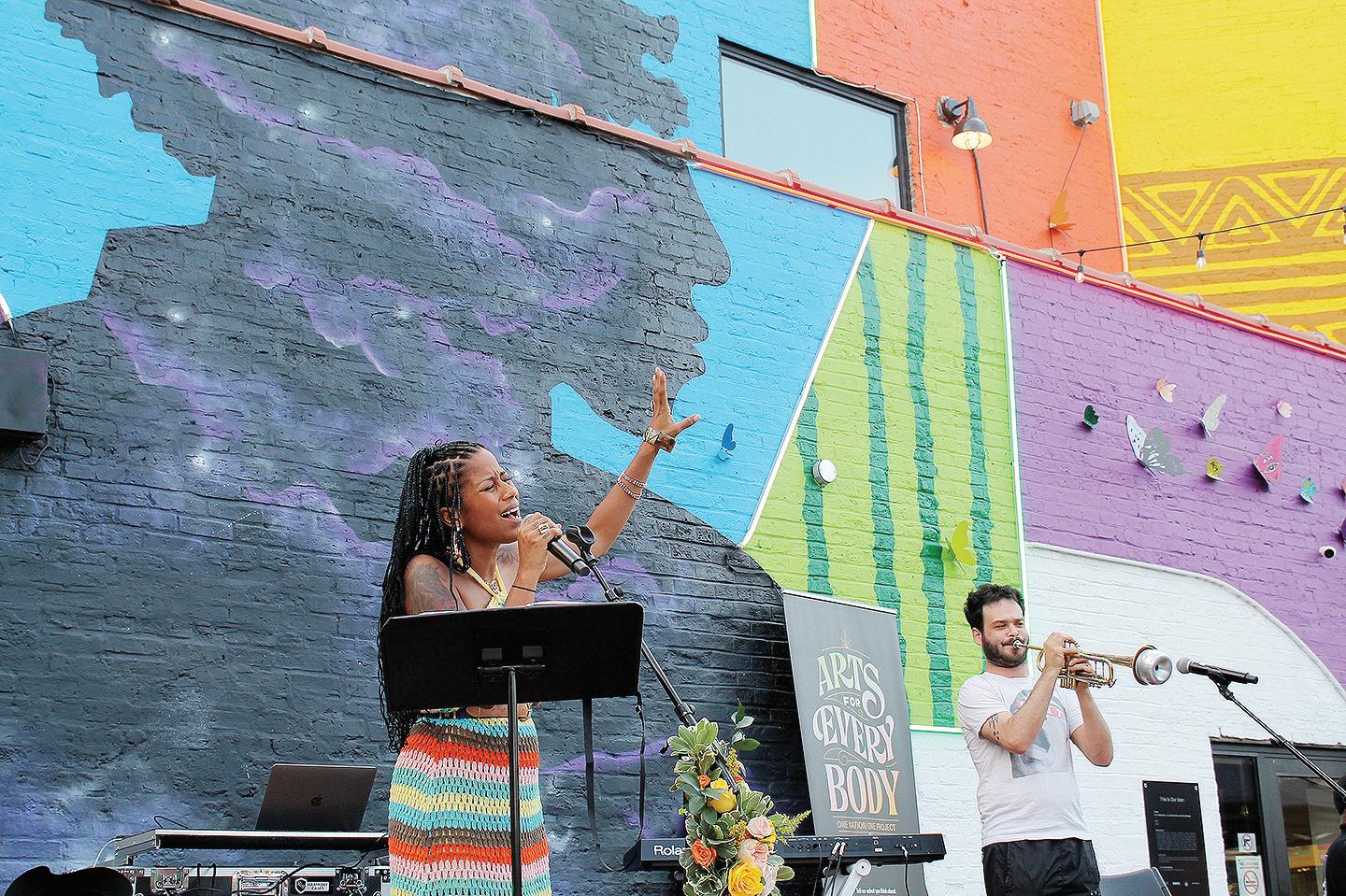
Investments in ‘Third Spaces’ Spotlight Community Arts Initiatives
Next Stop: Chicago provides grant funding to creative organizations on Chicago’s South and West Sides ahead of the Democratic National Convention.
BY JASMINE BARNES
As thousands from across the country visit Chicago for the Democratic National Convention (DNC), community organizations on the South and West Sides are using art to change the narrative about the city. Throughout the summer, Gertie, a civic and cultural agency expanding the impact of Chicago’s creative economy, awarded more than $400,000 in funding to community-based organizations for its latest initiative, Next Stop: Chicago. With support from foundations including
Good Chaos, the Joyce Foundation and the Pritzker Traubert Foundation, Gertie provided grants ranging from $10,00080,000 to various community partners who were selected to bring attention to “third spaces”—gathering spaces outside of work and home—on the South and West Sides of the city.
“Next Stop: Chicago is designed to highlight the important intersection of infrastructure and the arts through installations and programs that address resource allocation and
Aja Monet and Nico Segal perform at IMAN's Arts for Every Body Mini-Fest.
Photo by Jasmine Barnes
infrastructure inequity—an issue that has disproportionately impacted Black and brown people in this city,” said Abby Pucker, Gertie’s founder and CEO.
Gertie amplifies the creative placemaking work happening in Chicago by investing in under-resourced creative businesses. Next Stop: Chicago showcases the ways in which the arts, alongside the beautification of and investment in infrastructure, can drive economic growth. While discourse about Chicago often focuses on the challenges the city faces, Gertie seeks to elevate community-led efforts to revitalize neighborhoods by drawing the attention of DNC guests from downtown to communities on the South and West Side.
“We have been constantly reimagining space, revitalizing space, and doing our best to give the community what it needs,” said Binta Diallo, Associate Director of Arts & Culture at Inner-City Muslim Action Network (IMAN), a community organization that fosters health, wellness and healing on the South Side of Chicago. IMAN is one of several organizations receiving Next Stop: Chicago funding.
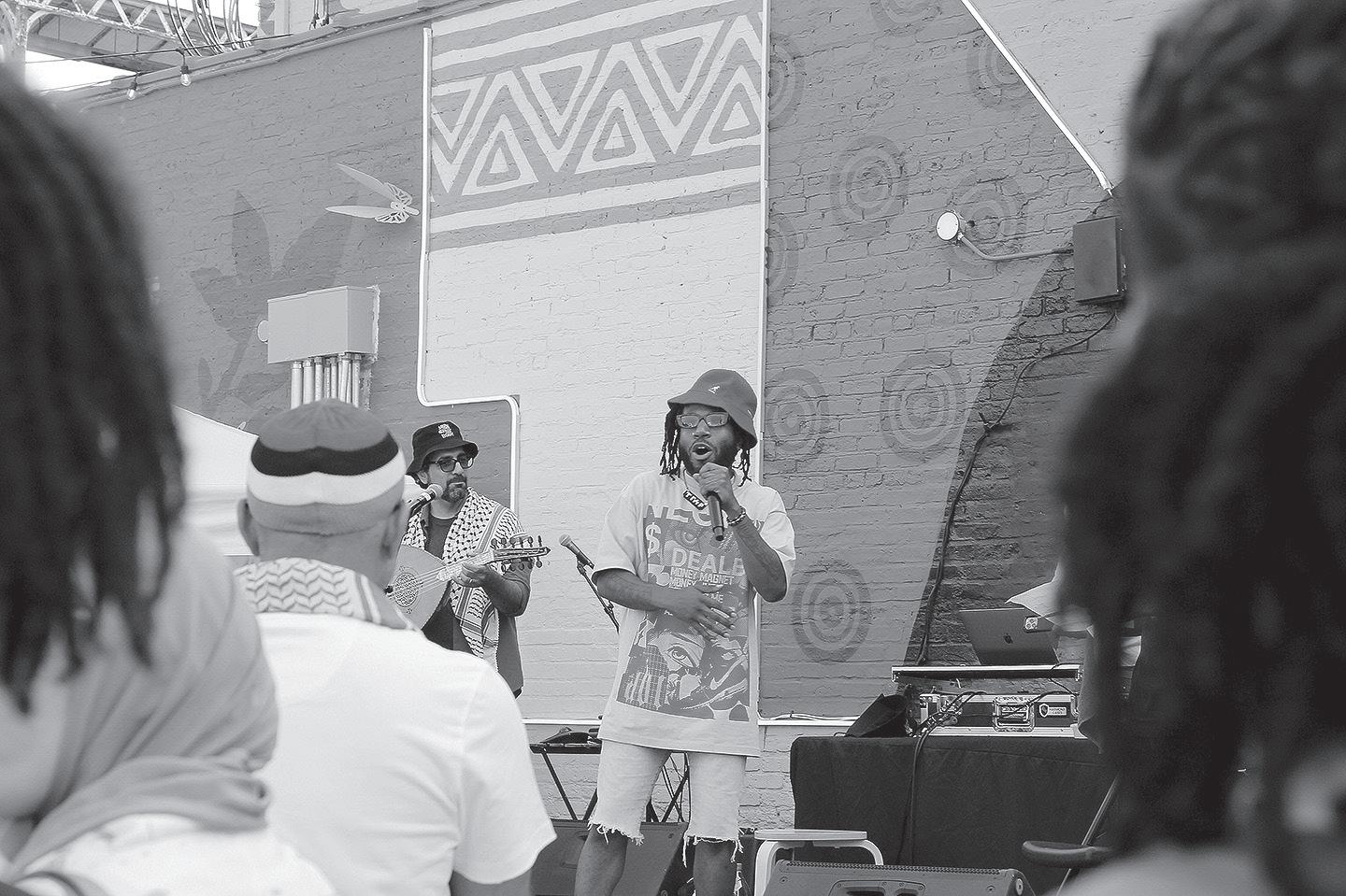
is symbolic of the disinvestment IMAN is actively fighting against.
IMAN’s Arts for EveryBody MiniFestival, one of the series’ kickoff events, took place on July 27 at Go Green Griot Plaza, a new community hub in Englewood. The festival highlighted the importance of storytelling and expression, featuring stunning performances by renowned artists including Grammy-nominated poet aja monet, Grammy-nominated musician John Forte, Englewood native Heavy Crownz, and hip-hop artist Omar Offendum. Celebrated rapper (and The Chi actor) Vic Mensa not only graced the stage, but vowed to continue supporting Next Stop: Chicago’s initiatives by hosting a series of short videos on the project leading up to the DNC.
The plaza, an outdoor space for community art developed on a previously abandoned lot at the corner of 63rd St. and S. Racine Ave., adjoins the former Racine Green Line station, where trains zoomed past throughout the festival. In 1994, the city closed the train stop in what was supposed to be a temporary closure for repairs. For nearly three decades, residents and organizations, including IMAN, have advocated for reopening the stop, which remains shuttered today. The juxtaposition of the vibrant plaza against the train stop
A mural containing the phrase “This is Our Story,” served as the bright backdrop for the day’s festivities. The art piece, created by Eric Hotchkiss and Ash Busse, commemorates the legacy of
honors roller rinks as important spaces for community connection. The exhibitions’ co-curators Nnaemeka Ekwelum and Alexandria Eregbu met in 2020 as participants in one of Blanc gallery’s inaugural artist residencies and are the co-founders of AfroDisco Social Hour, a
Spaces like roller rinks cultivated Black traditions and culture as a form of resistance and innovation in the face of discrimination.
griots, West African storytellers revered for preserving their communities oral traditions. Three-dimensional butterflies featured on the mural include the written reflections of elders who shared parts of their story as longstanding members of the Englewood community. To commemorate the recreational spaces of Englewood’s past, Hotchkiss featured lights near the mural in remembrance of a community skating rink from generations past.
This Heavenly Body, a new exhibition funded by Next Stop: Chicago and on display at Blanc Gallery in Bronzeville, also
collective bridging Chicago’s Black diaspora together through cultural experiences. These authentic connections with the gallery space and each other eventually led to the curation and development of This Heavenly Body. Featured artist Seed Lynn’s dynamic photographs document the role roller skating rinks play in Black communities and serve as a political response to the nationwide closures of roller-skating rinks, bowling alleys, amusement parks, and other social spaces that promote and facilitate Black gathering and community building. The non-traditional layout of the
gallery space, mirroring the circular orbit of a rollerskating rink, creates a unique constellation of connections between the objects and the viewer. An array of colorful photographs featuring Black people skating under neon lights with their children, lovers and friends encapsulates the joyful respite these recreational spaces offer.
“[Skating] triggers memories of childhood and nostalgia,” said Ekwelum. “I love when adults find ways to play and just be within their bodies with each other, especially Black people being able to experience and embody freedom through these activities. It might not be our consistent experience every day in the world, but there are spaces of refuge where we can come and practice how to fly, how to glide.”
Ekwelum, a PhD candidate in Black studies at Northwestern University, contextualizes the importance of the exhibition in the history of segregation that often kept Black people out of “third spaces” like swimming pools, amusement parks, and dance halls. Spaces like roller rinks cultivated Black traditions and culture as a form or resistance and innovation in the face of discrimination. This Heavenly Body’s closing activation will include a temporary roller skating rink behind Blanc Gallery for guests to reclaim this endangered tradition.
“The work that we’re doing around this project is really important because it is speaking to something that kept Black people together, [where] we can come together safely and express and share our values,” said Eregbu.
Gertie hopes initiatives like these will create a kind “critical mass” that shows organizations across the South and West Sides are strategically building regenerative community spaces where they’ve been lost or taken away. With the world’s eyes on Chicago this week, Next Stop: Chicago turns the collective’s gaze to the creative talent and innovation that extends far beyond the Loop. ¬
Jasmine is a writer, facilitator and community builder living in Woodlawn. You can learn more about her work at www. jasbarnes.com.
Englewood musician Heavy Crownz performs at IMAN's Arts for EveryBody Mini-Festival. Photo by Jasmine Barnes
Pomp, Pageantry and Protests on DNC’s Final Night
A-list actors, musicians, civil rights leaders, and Vice President Kamala Harris brought the crowd to its feet countless times.
BY ALMA CAMPOS
Delegates, journalists, police officers, volunteers and others, waited in long lines at food trucks to grab a quick bite before working the Democratic National Convention on closing day. The smells of fried fish, birria, elotes, tacos, and cajun shrimp filled the air in a small area outside the arena just minutes before the program began.
The football-bowl shaped stadium fit approximately 25,000 people with specific designated areas for everyone. A-list actors, musical performers, iconic civil rights leaders, and, the star of the night, Vice President Kamala Harris, brought the crowd to a thunderous roar countless times.
For the first time, the DNC invited content creators and social media influencers. Two hundred of them were brought in to interview big names—in special areas to deliver instant updates to millions of followers on platforms around the world. It was of no surprise why some credentialed reporters complained about cramped seating and lack of attention.
The evening’s soundtrack was indeed a reflection of the Democrats’ goal to reach people on all political sides.
Between speeches, DJ Metro got the crowd dancing and singing along with a mix of music from “Get Low” to “Despacito,” to “Texas Hold’em” and even Bruce Springsteen’s classic, “Born in the USA,” which Harris’ VP pick Tim Walz sang along to.
Notable moments included the crowd’s one minute standing ovation and longest applause for Elizabeth Warren which moved her to tears. The Massachusetts senator and leading progressive ran for president in 2020. “You know what I love about Kamala Harris? She can’t be bought and she can’t be bossed around,” Warren said during her speech.
Aside from words of support for Harris, something Warren and other Democrats did boldly that night was to remind millions of viewers and the delegates of Trump’s felony crimes. “Donald Trump,
the felon, has no plans to lower costs for families,” she said. “When did he ever fill up a gas tank or worry about a grocery bill?”
In a fiery speech, Rev. Al Sharpton delivered a passionate message pointing to Trump’s racist remarks at the National Association of Black Journalists convention about migrants taking “Black jobs.”
“This man said here in Chicago a few weeks ago, refusing to apologize for claims that migrants were taking Black jobs. Well in November, we gon’ show him, when Blacks do their jobs. And we are going to join with whites, and Browns and Asians and we are going to do a job on those who have done a job on us.”
Sharpton also introduced members of the Central Park Five, who were wrongly convicted of rape and assault in Central Park in New York City in 1989. They were later exonerated and the city awarded them $41 million in 2014, after the five men had already served forty-one years in prison. Trump supported bringing back the death penalty in the case, even after the exoneration.
Out of the five, four appeared on the stage: Yusef Salaam, Korey Wise, Raymond Santana and Kevin Richardson and they addressed the arena.
“He wanted us dead. Today, we are exonerated,” said Salaam, who is now a New York City Council member.
“Our youth was stolen from us,” Wise said. “We were innocent kids, but we served a total of forty-one years in prison.”
The case for national security dominated the night and people’s patriotic chants of “USA, USA, USA” were loud and thunderous throughout, synonymous with American exceptionalism.
Former Secretary of Defense Leon Panetta walked up to the stage to Survivor’s “Eye of the Tiger,” notably featured in the movie Rocky.
His speech didn’t get as much of an applause as other speakers, but he took a strong stance as he reminded people that under his role as CIA director, the U.S.
killed Osama Bin Laden during a nighttime raid in Pakistan. “Because nobody attacks our country and gets away with it, nobody.”
Panetta added that the U.S. needs a “tough cool-headed Commander-inChief” and that Harris is the person for the job. “Trump tells tyrants like Putin they can do whatever the hell they want. Kamala Harris tells tyrants, ‘the hell you can, not on my watch.’”
He had a strong message about Ukraine’s sovereignty, which he said under Trump was vulnerable. “[Kamala Harris] has worked with president Zelensky to fight back against Russia, she knows that protecting their democracy protects our democracy as well.”
In general, the positive messages on immigration during the DNC contrast heavily with Trump’s rhetoric at the RNC and delegates there waving “Mass Deportation Now!” signs.
But it remained unclear how the daughter of immigrants from Jamaica and India would approach immigration. Harris presented two juxtaposed promises to appeal to varying sides: securing the border and creating a pathway to citizenship for eleven million undocumented individuals— something Democrats have time and again promised.
“Here is my pledge to you,” she said. “As President, I will bring back the bipartisan border security bill…And I will sign it into law…I know we can live up to our proud heritage as a nation of immigrants and reform our broken immigration system.”
But the most poignant of issues that evening was Israel’s war on Gaza. Through the night, at different times, protesters inside the venue identified as uncommitted voters wore keffiyehs, symbolizing Palestinian solidarity, gathered arm-in-arm and demanded “ceasefire now.”
Harris began with her support of Israel’s self-defense but this followed with several people in the crowd yelling “Free Palestine” as Harris spoke.
Eventually, her speech was met
with loud cheers and applause after she expressed support for ending the suffering in Gaza, negotiating a ceasefire between Israel and Hamas, releasing hostages, and recognizing Palestinian people’s dignity, security, freedom, and self-determination.
Despite pleas from pro-Palestinian delegates, Palestinian Americans were denied a speaking slot at the convention.
Convention workers on Thursday evening popped thousands of white, red and blue balloons that had fallen down on the arena after Harris accepted her nomination and met her husband Douglas Emhoff, Walz and his wife Gwen on the stage.
After congratulatory moments, the teleprompters read, “Get off the stage” to let them know that it was over.
The food truck vendors were long gone and convention-goers were ordering rideshares, taking the train home or going to a party to celebrate. The journalists scattered into the crowds on their work assignments, some on their way home to write. Content creators, with smiling faces wrapped up the highlights of the night to followers online behind a blue and white United Center backdrop.
Democratic supporters filtered out of the event carrying signs that read “Kamala” and some even rescued a couple of leftover balloons as souvenirs. As they made their way home, attendees were met with the chants of pro-Palestinian demonstrators on the street. A strong cordon of security surrounded the space.
Thousands of demonstrators had been protesting outside the convention for four days calling on Democrats to do more to end the war in Gaza, such as putting an end to weapons shipments to Israel.
Some signs read, “All Palestine be Returned to Palestinian Sovereignty” and “Democrats Fund the Genocide of Palestinians.” They were not going home. ¬
Alma Campos es una editora principal del Weekly
Fiestas, espectáculos y protestas en la noche final de la DNC
Actores de primera fila, músicos, líderes de los derechos civiles y la Vicepresidenta Kamala Harris pusieron al público en pie en innumerables ocasiones.
POR ALMA CAMPOS
Delegados, periodistas, policías y voluntarios, entre otros, hicieron largas colas ante los camiones de comida para poder comer algo antes de trabajar en la Convención Nacional Demócrata (DNC) en su día final. Los olores a pescado frito, birria, elotes, tacos y camarones al estilo cajún llenaban el aire en una pequeña zona afuera del estadio apenas unos minutos antes de que comenzara el programa.
En el estadio, cupieron unas 25,000 personas, con zonas específicas de varios niveles. Actores de primera fila, artistas musicales, icónicos líderes de los derechos civiles y, la estrella de la noche, la Vicepresidenta Kamala Harris, hicieron retumbar al público en innumerables ocasiones.
Por primera vez, la DNC invitó a creadores de contenido y a influencers en las redes sociales. Doscientos de ellos fueron invitados a entrevistar a grandes nombres en zonas designadas para ofrecer actualizaciones instantáneas a millones de seguidores en plataformas sociales. No es de extrañar que algunos periodistas con credenciales se quejaron de la poca capacidad de asientos y de que no se les prestara la misma atención.
Las canciones de la noche reflejaron el objetivo de los demócratas de llegar a todos los partidos políticos.
Entre los discursos, el DJ Metro hizo bailar y cantar al público con una mezcla de música que iba desde “Get Low” a “Despacito”, a “Texas Hold’em” e incluso una canción de Bruce Springsteen, “Born in the USA”, la cual también cantó Tim Walz, el candidato a vicepresidente y compañero de fórmula de Harris.
Hubo momentos notables, como la ovación de un minuto del público y el aplauso más prolongado para Elizabeth Warren, lo cual la hizo llorar. La senadora de Massachusetts y destacada progresista se postuló como candidata a la presidencia en 2020. "¿Saben qué es lo que me encanta de Kamala Harris? Que no puede ser comprada y no puede ser mangoneada", dijo Warren durante su discurso.
Aparte de las palabras de apoyo a Harris, algo que Warren y otros demócratas hicieron con audacia esa noche fue recordarles a los millones de espectadores y a los delegados los crímenes de Trump. “Donald Trump, el delincuente, no tiene
planes para reducir los costos para las familias”, dijo. “¿Cuándo ha llenado él alguna vez un tanque de gasolina o se ha preocupado por los gastos del mandado?”
En un encendido discurso, el reverendo Al Sharpton dio un apasionado mensaje señalando los comentarios racistas de Trump en la convención de la Asociación Nacional de Periodistas Negros sobre los migrantes que roban los “empleos de los negros.”
“Este hombre dijo aquí en Chicago hace unas semanas, negándose a disculparse por las afirmaciones de que los migrantes estaban quitando empleos de los negros. Pues en noviembre se lo vamos a demostrar, cuando los negros hagan su trabajo. Y vamos a unirnos a los blancos, a los latinos y a los asiáticos y vamos a ganar.”
Sharpton también introdujo a los miembros de “Los cinco de Central Park,” que fueron condenados injustamente por violar y agredir a una mujer en Central Park en Nueva York, en 1989.
Después fueron exonerados y la Municipalidad les concedió $41 millones en 2014, cuando los cinco hombres ya habían cumplido cuarenta y un años de cárcel. En ese tiempo, Trump había establecido de nuevo la pena de muerte en el caso, incluso después de la exoneración.
De los cinco, cuatro aparecieron en el escenario: Yusef Salaam, Korey Wise, Raymond Santana y Kevin Richardson, y se dirigieron al público.
“Nos quería muertos. Hoy estamos exonerados”, dijo Salaam, que ahora es miembro del Concejo Municipal de la Ciudad de Nueva York.
“Nos robaron nuestra juventud”, dijo Wise. “Éramos muchachos inocentes, pero cumplimos un total de cuarenta y un años de cárcel”.
Los argumentos a favor de la seguridad nacional dominaron la noche, y los gritos del público sonaron con fuerza, “USA, USA, USA”, a lo largo del evento, típico del excepcionalismo estadounidense.
El ex Secretario de Defensa Leon Panetta subió al escenario al son de “Eye of the Tiger” del grupo Survivor, que aparece en la película Rocky.
Su discurso no recibió tantos aplausos como el de otros oradores, pero adoptó una postura firme al recordarles a las personas que, bajo su cargo de director de la CIA,
Estados Unidos mató a Osama Bin Laden durante una redada nocturna en Pakistán. “Porque nadie ataca a nuestro país y se sale con la suya, nadie”.
Panetta agregó que Estados Unidos necesita un “Comandante en Jefe duro y moderado" y que Harris es la persona indicada para el puesto. "Trump les dice a tiranos como Putin que pueden hacer lo que se les dé la gana. Kamala Harris les dice a los tiranos: 'al carajo, no bajo mi guardia'".
Tuvo un fuerte mensaje sobre la soberanía de Ucrania, de la que dijo que bajo Trump era vulnerable. “[Kamala Harris] ha trabajado con el presidente Zelensky para defenderse de Rusia, sabe que proteger su democracia protege también la nuestra”.
En general, los mensajes positivos sobre la inmigración durante la DNC contrastan fuertemente con la retórica de Trump en la Conferencia Nacional Republicana (RNC, por sus siglas en inglés) y donde los delegados exhibieron carteles que decían “¡Deportación masiva ya!”.
Pero seguía sin estar claro de qué manera la hija de inmigrantes de Jamaica y la India trataría la situación de inmigración. Harris presentó dos promesas opuestas para atraer a distintos grupos de votantes: asegurar la frontera y crear una vía a la ciudadanía para once millones de indocumentados, algo que los demócratas han prometido una y otra vez.
“Esta es mi promesa”, dijo Harris. “Como Presidenta, volveré a presentar el proyecto de ley bipartidista de seguridad fronteriza... Y lo convertiré en ley... Sé que podemos estar a la altura de nuestra orgullosa herencia como nación de inmigrantes y reformar nuestro deficiente sistema de inmigración”.
Pero el asunto más conmovedor de la noche fue la guerra de Israel contra Gaza. A lo largo de la noche, en distintos momentos, manifestantes dentro del recinto identificados como votantes no comprometidos llevaban keffiyehs, símbolo de la solidaridad palestina, y se agarraron de los brazos exigiendo una “inmediata cesación del fuego”.
Harris comenzó su discurso estableciendo su apoyo a la autodefensa de Israel, pero a continuación varias personas del público gritaron "Palestina libre" mientras Harris hablaba.
Finalmente, su discurso fue recibido con fuertes aplausos y gritos de alegría tras expresar su apoyo al fin del sufrimiento en Gaza, la negociación de una cesación del fuego entre Israel y Hamás, la liberación de los rehenes y el reconocimiento de la dignidad, la seguridad, la libertad y la autodeterminación de las personas palestinas.
A pesar de las súplicas hechas por los delegados propalestinos, a los palestinos estadounidenses se les negó un turno para hablar en la convención.
El jueves por la noche, los trabajadores de la convención reventaron miles de globos blancos, rojos y azules que habían caído sobre la arena después de que Harris aceptara su candidatura y se reuniera en el escenario con su marido, Douglas Emhoff, Walz y su esposa, Gwen.
Tras los momentos de felicitación, los teleprompters leyeron: “Bajen del escenario” para hacerles saber que el evento había terminado.
Los camiones de comida ya se habían ido y los asistentes a la convención pedían autos compartidos, tomaban el tren a casa o se iban a seguir la fiesta. Los periodistas se dispersaron entre la multitud a sus tareas de trabajo, algunos de camino a casa para escribir. Los creadores de contenido, con caras sonrientes, transmitían lo más destacado de la noche a sus seguidores en internet cerca de un fondo azul y blanco del United Center. Los simpatizantes demócratas se filtraron fuera del evento portando pancartas que decían “Kamala” y algunos incluso rescataron globos sobrantes como recuerdo. Mientras se dirigían a sus casas, los asistentes se encontraron con manifestantes propalestinos en la calle. Una fuerte presencia de policía rodeaba el lugar.
Miles de los manifestantes llevaban cuatro días protestando frente a la convención para suplicar a los demócratas que hagan más para poner fin a la guerra en Gaza, como por ejemplo poner fin a los envíos de armas a Israel.
Algunas pancartas decían: “Toda Palestina debe ser devuelta a la soberanía palestina” y “Los demócratas financian el genocidio de los palestinos”. Ellos aún no se irían a casa. ¬
Alma Campos es una editora principal del Weekly
CPD Document Sheds Light on DNC Security Plan
The out-of-town officers were housed in a University of Chicago dormitory in Woodlawn.
BY JIM DALEY AND MAX BLAISDELL
Police officers from multiple state and federal law enforcement agencies were in Chicago last week to assist the Chicago Police Department (CPD) in providing security for the Democratic National Convention (DNC). The Weekly obtained the intergovernmental agreement the department signed with those agencies. While it sheds some light on the requirements and duties outside officers are subject to while policing the convention, information about which agencies provided officers was redacted.
Documents obtained by a publicrecords request to the Illinois Law Enforcement Alert System, an interagency resource-sharing organization, show that outside agencies were required to participate in DNC training activities coordinated by the Chicago Police Department (CPD). Outside officers’ policing duties during the convention were to “be determined solely by CPD and may comprise all aspects of law enforcement including, but not limited to traffic control, security detail and crowd control,” the document reads. The complete, redacted document can be read online at bit.ly/CPD_DNC.
Officers assigned to police the DNC must have been on the job for at least two years and be “in good standing” with their home department. They cannot have been personally sued in the past three years and found liable for First Amendment violations, or have “any sustained complains for excessive, unreasonable or unnecessary force” in the last five years.
Outside officers were required to abide by “applicable CPD policies” while policing the convention. The agreement makes no mention of the federal consent decree the department is currently under.
Most outside officers were required to be accompanied by at least one Chicago
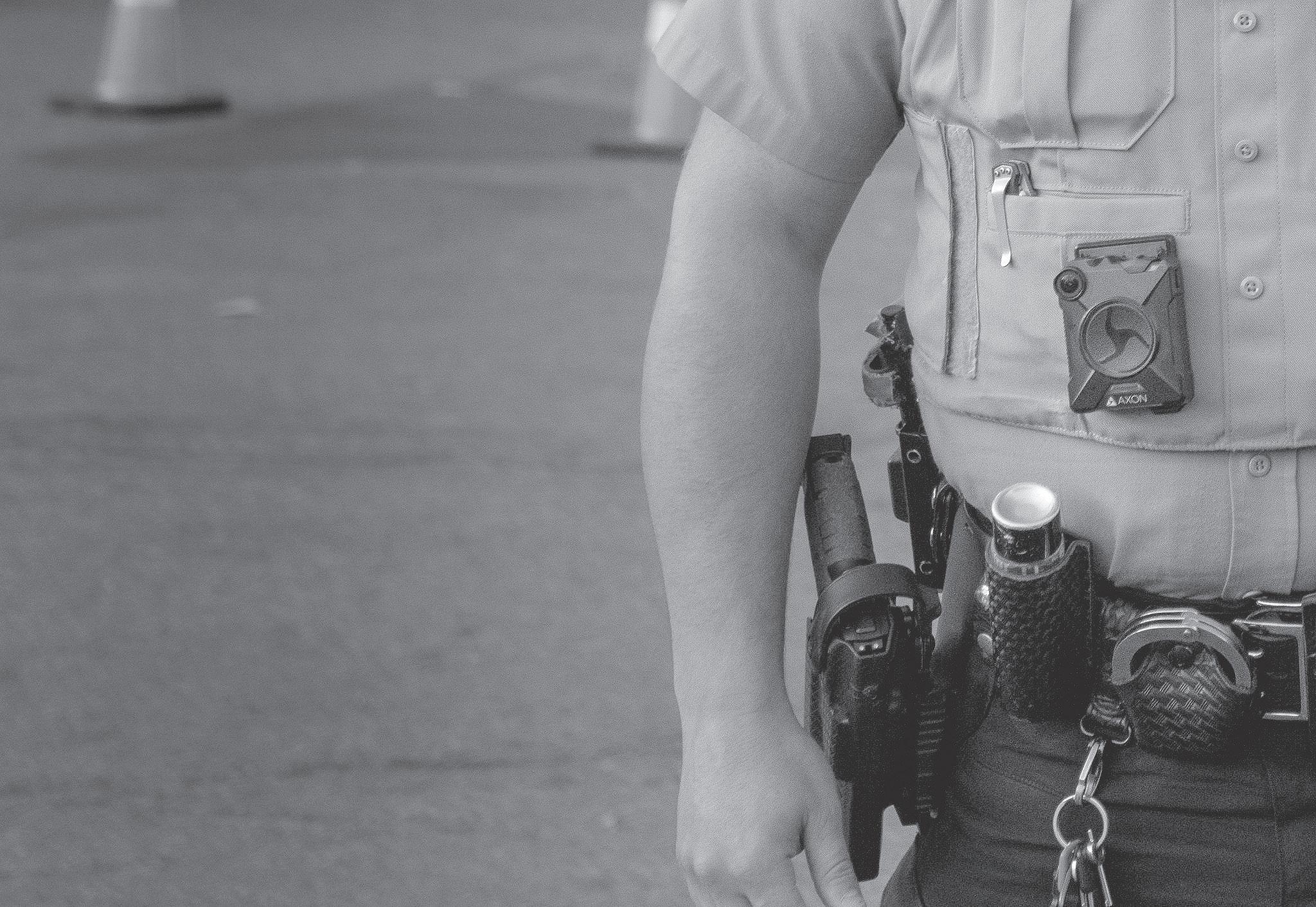
police officer, who will be responsible for making any arrests. Outside officers were prohibited from making arrests “unless required to do so by emergent circumstances in which a CPD officer is not available or capable” of doing so, the document reads.
Eight pages that list the names of agencies providing officers are completely redacted. In a letter accompanying the agreement, ILEAS cited a section of the state FOIA law that allows information about “unique or specialized investigative techniques” to be withheld.
Weekly reporters observed officers from the Cook County Sheriff’s Office, Illinois State Police, Joliet Police Department, Kankakee County Sheriff, and departments in suburbs such as Bolingbrook, Bridgeview, Flossmoor, and West Chicago at the DNC last week.
Ahead of the convention, a coalition of attorneys and legal groups signed an open letter to CPD superintendent Larry Snelling and Mayor Brandon Johnson expressing “grave concerns” about the
department’s plans for demonstrations at the DNC. The coalition noted recent comments by Snelling and revisions the CPD made to its mass arrest policy that were made public this month among its concerns. It also wrote that the City has prosecuted peaceful pro-Palestine demonstrators, and claimed the department has given “contradictory”information about where protesters will be jailed.
The letter was signed by the American Civil Liberties Union of Illinois, Illinois Black Advocacy Initiative, Law For Black Lives, the Movement Law Lab, Muslims for Just Futures, the National Lawyers Guild Chicago, Northwestern Pritzker School of Law Bluhm Legal Clinic, Palestine Legal, the People’s Law Office, and dozens of attorneys and legal workers.
“People have a right to exercise their First Amendment rights to speech and assembly, including rallying, marching and demonstrating,” the letter reads. “We are calling on you to respect and honor those cherished, sacrosanct rights.”
The Hyde Park Herald broke the news ahead of the convention that officers from outside departments would be housed in the University of Chicago’s Woodlawn dormitory, 1156 E. 61st St. A university spokesperson later confirmed that in a statement.
“During the Democratic National Convention (DNC), law enforcement personnel from outside of Chicago will be housed for approximately one week in a residence hall on the University’s campus at the request of the City of Chicago,” the spokesperson wrote in an email to the Weekly. “Nearby residents and people on campus may notice additional law enforcement personnel and vehicles in the area during the week of the DNC. These law enforcement officials will provide security during the DNC within and in areas around convention spaces. Every summer the University hosts thousands of guests in our residence halls, ranging from high school students to visiting scholars to nonprofit groups.”
According to campus organizers, some 500 outside officers are expected. The Weekly was unable to independently confirm that number by press time.
On August 7, The TRiiBE reported in a story co-published with the Weekly that the vast majority of federal funds for DNC security are going to the CPD. A document obtained from the Office of Budget Management by TRiiBE reporter Corli Jay was heavily redacted, but offered some details on what expenses the funding will cover, including payroll, travel, and more. ¬
Jim Daley is the Weekly’s investigations editor. Max Blaisdell is a fellow with the Invisible Institute and a staff writer for the Hyde Park Herald
A Minneapolis Police Department officer wears a body camera while responding to a call on October 25, 2019.
Photo by Tony Webster via ShareAlike
Obamas’ Hope Message Contrasts With Protests Over South Shore Displacement, Gaza
Michelle and Barack Obama gave speeches last Tuesday evening at the DNC.
BY TONIA HILL, THE TRIIBE
This story was originally published by The TRiiBE, an award winning digital news outlet in Chicago that is reshaping the narrative of Black people. It is being republished in South Side Weekly in collaboration with The TRiiBE.
Former President Barack Obama and former First Lady Michelle Obama headlined the second night of the Democratic National Convention (DNC). The Obamas were last in Chicago for the funeral of Michelle Obama’s mother, Marian Robinson, in June.
Reflecting on her mother’s values, Michelle Obama said, “she believed that all children, all people have value. That anyone can succeed if given the opportunity. She and my father didn’t aspire to be wealthy, in fact, they were suspicious of those who took more than they needed.”
“They understood that it wasn’t enough for their kids to thrive if everyone else around us was drowning,” she added.
She also noted that Vice President Kamala Harris was raised similarly and
shares those values.
“Even though our mothers grew up an ocean apart, they shared the same belief in the promise of this country,” Michelle Obama said. “That’s why her mother moved here from India at 19. It’s why she taught Kamala about justice, about our obligation to lift others up, about our responsibility to give more than we take.”
Before the Obamas took the stage on Tuesday night, the atmosphere in the United Center was jubilant as delegates from each state participated in a ceremonial and celebratory roll call to nominate Vice President Kamala Harris as the 2024 Democratic nominee for president.
However, during the roll call, some delegates from Minnesota staged a silent protest by remaining quiet and holding up signs with the names of Palestinians who were killed in Gaza. Back in March, Minnesota voters wanting a ceasefire in Gaza sent a message to Democrats with nearly 19 percent of its primary votes going to the “uncommitted” category.
During Obama’s speech, there were
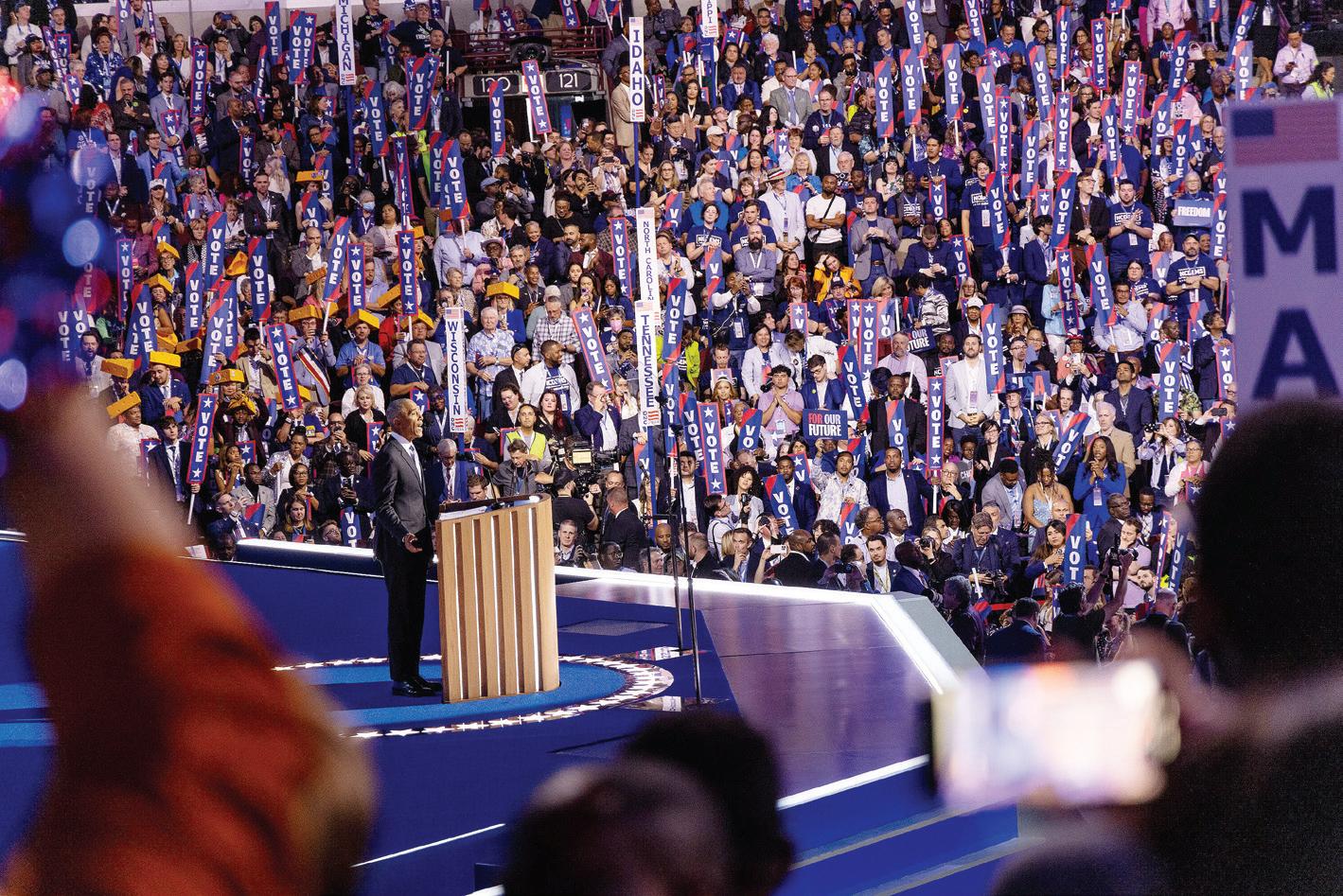
cheers and raucous applause, and midway through his speech, the former president invoked his famous 2008 campaign chant, saying, ‘Yes, she can,’ in reference to Harris. The room echoed the energy of Obama’s early campaign rallies as the crowd joined in, chanting, “Yes, she can. Yes, she can.”
Both of the Obamas’ speeches stirred emotions in the room and were unifying in nature. Neither shied away from talking about the divisiveness between each political party and people who share different ideological stances and implored the room to come together despite those differences.
“That sense of mutual respect has to be part of our message. Our politics has become so polarized these days that all of us, across the political spectrum, seem quick to assume the worst in others unless they agree with us on every single issue,” President Obama said. “We start thinking that the only way to win is to scold and shame and out yell the other side. And after a while, regular folks just tune out or don’t bother to vote at all,” he continued. Obama also emphasized that progress requires acknowledging people’s “blind spots, contradictions, and prejudices.” He added that, to gain the support of those










Former President Barack Obama speaks at the DNC on Tuesday, August 20, 2024.
Photo by Michael DiGioia
who don’t yet back Harris, there must be mutual respect and a willingness to listen on both sides.
Tennessee State Representative Justin Jones spoke to the contrasting feelings of experiencing joy within the halls of the United Center as the DNC progresses amid ongoing conflicts in the U.S. and abroad in Gaza.
“We are multifaceted. There’s a poem by Lucille Clifton, and she says, ‘Why don’t you celebrate with me? Every day, something has tried to kill me has failed,’” Jones told The TRiiBE.
“I believe that we have to have joy in our activism as well. Joy is necessary in the system of white supremacy. I work in a state legislature with 75 white men who, every day, tell me I don’t belong there, who kicked me out, who kicked me off my committees, who don’t even let us talk about issues,” he added.
In 2023, the Tennessee House of Representatives voted to expel Jones and Justin Pearson, another Black member of the state’s House of Representatives. They were expelled due to their involvement in gun control demonstrations at the state legislature.
Yet, while the Obamas’ speeches inside the United Center called for unity, outside, the nation and the city of Chicago were grappling with deep-seated conflicts. Organizers nationwide and in Chicago are marching in the streets, demanding that President Joe Biden and Vice President Harris end their support for Israel’s actions against Palestinians.
Meanwhile, on the South Side, residents continue to push for a community benefits agreement (CBA) for those living near the Obama Presidential Center (OPC) in South Shore.
“Our campaign has always been about not stopping the center, but making sure that the city is doing everything it can to ensure that long-term residents, Black folks who’ve been around the center in Woodlawn and South Shore for decades, are able to stay,” Dixon Romeo said, referring to the OPC in Jackson Park.
Romeo is a resident of South Shore and the executive director of Not Me We, a grassroots community group building power for poor and working-class folks in South Shore.
He’s also an organizer with the Obama Community Benefits Agreement
Coalition. This group was formed in 2016 to protect area residents from displacement due to the development of the OPC in Jackson Park.
During a community meeting in 2017, Obama said his foundation—the Obama Foundation—wouldn’t sign a CBA because it doesn’t represent all of the community’s interests.
Despite Obama’s lack of support for a CBA, organizers with the Obama CBA coalition have pressed on and have secured victories through the passage of the Woodlawn Housing Preservation Ordinance in 2020, and the 2023 municipal election in which nearly 90% of South Shore residents supported a ballot referendum for the proposed South Shore CBA ordinance.
With the OPC nearing completion, Romeo and the Obama CBA coalition are pushing for the passage of the South Shore Housing Preservation Ordinance, a package of policies that would prevent displacement in South Shore.
However, without the full support of the Chicago City Council, the ordinance has stalled since it was introduced last fall.
Ald. Michelle Harris (8th Ward), whose ward includes South Shore, Chatham, Calumet Heights, Pullman, Avalon Park, Burnside and South Chicago, declined to explain whether she supports the measure at the DNC on Tuesday night.
“I’ve not been asked to really be a part of it,” Harris told The TRiiBE on the floor of the United Center. Harris is also an Illinois delegate for the Democratic Party of Illinois.
Ald. Desmon Yancy (5th Ward), the lead sponsor of the ordinance, is now pushing for a subject matter hearing on the proposal, but progress on scheduling that meeting remains uncertain.
As the convention goes on, it remains unclear whether Democratic leaders will listen to the demands of some delegates and voters outside the DNC. They are demanding an end to the genocide in Gaza and urging local leaders to pass legislation that prevents displacement in South Shore.
“If I could talk to the former president, I would just impress upon him whatever he could do to get [Mayor] Brandon Johnson to take action and make sure we get the CBA,” Romeo said. ¬
The World Keeps Watching in Medium Cool
A 1969 movie filmed and set during the infamous ‘68 DNC was eerily prescient about the role of media in desensitizing us to violence.
BY SAVANNAH RAY HUGUELEY
Leading up to and throughout this year’s Democratic National Convention (DNC), the legacy of the 1968 DNC in Chicago has been evoked by several outlets, cultural curators, protestors, organizers, and city officials. The comparisons drawn numerous, both inside and outside of the massive convention centers—then, the International Amphitheater with Grant Park at the center of protests, and now, the United Center and mostly Union Park.
Some narrative comparisons centered the drama surrounding the convention itself. Vice President Kamala Harris accepted the presidential nomination for the Democratic Party at the last minute just as Vice President Hubert Humphrey stepped in when incumbent Lyndon B. Johnson, falling behind in the polls, announced his withdrawal from the race, notably in the same speech he said the U.S. would begin negotiation talks with North Vietnam.
One of the more common anticipated similarities focused on the anti-war protests and police response. The summer of 1968 had brought the Holy Week Uprisings across the country following the assassination of Dr. Martin Luther King, Jr., and increased demonstrations against the Vietnam War, which the U.S. had been funding and waging for over a decade by then. With protests against the longstanding apartheid and U.S.-funded
genocide of Palestinians by Israel ramping up since late last year, and organizers planning actions around the DNC, a similar level of protest was expected.
Haskell Wexler’s 1969 film Medium Cool is among the prescient relics of 1968 that resurfaced as people prepared for the protests at this year’s convention. The film was screened at the Music Box Theatre in Lakeview a few weeks before the DNC. The American New Wave classic could be called both documentary and narrative film, but the movie itself would argue that those are actually indistinguishable.
Released in 1969, the film’s loose narrative structure follows cameraman John Cassellis (Robert Forster) as he covers the 1968 DNC and the preceding months. Early on he is fired from his job— then presumably rehired offscreen—after discovering that the news station he works for has been offering up their footage to the police and FBI.
During his reporting, he meets and begins a romance with an Uptown woman, who recently arrived from Appalachia, Eileen (Verna Bloom), and her young pigeon-obsessed son, Harold (Harold Blankenship). The film intermingles narrative and reality in every sense, down to the casting; Harold, for example, was a boy from Uptown who the crew first met while filming there. Later in the movie, Eileen searches for her missing (fictional) son in Grant Park, amid the (very real) Youth
International Party, or Yippie, protests and police violence.
Unlike most movies that could fit into different decades, Medium Cool is embedded in this time period from the spring and summer of 1968. In fact, the film shows the political moment and violence of that year’s DNC to the point of facing censorship; two members of Paramount board of directors were top donors of the DNC and pushed for the film to not be distributed by Paramount.
The film transports viewers into the feelings of that moment in history. By late August of 1968, people were traumatized from the assassinations of Dr. King followed by Robert F. Kennedy, and the underlying decades-long Counterintelligence Program carried out by J. Edgar Hoover’s FBI that monitored and killed radical and Black liberation leaders like Black Panther Chairman Fred Hampton.
The ongoing war in Vietnam—that killed over two million civilians by the time the U.S. fully left in 1973—seemed to have no end in sight. Anticipating the public’s response during the DNC, former Mayor Richard J. Daley brought in a massive police presence and called in the Illinois National Guard. In what was later called a “police riot,” hundreds of protesters were beaten and arrested by the police.
Though the National Guard wasn’t called in this year, the city brought in as many as 500 police officers, mostly from Illinois agencies, in response to anticipated pro-Palestine protests. Various leftist and anti-war groups called for an arms embargo—and many for the repatriation of land to the Palestinian people—while the most the convention halls heard was the vague discussion of ceasefire talks.
The DNC denied the Uncommitted movement their request for a PalestinianAmerican speaker to have even two minutes to address the convention, and protestors’ concerns were confirmed with Harris stating in her acceptance speech that as commander-in-chief, she would “always ensure Israel has the ability to defend itself.”
The frequent comparisons to the 1968 DNC didn’t just permeate news narratives, but the actual protest calls and slogans of organizers. For example, Behind Enemy Lines, the self-described militant group who led the Tuesday demonstration in front of the Israeli consulate in the Loop, called for people to “make it great like
’68.” Not turning nearly as violent as the 1968 DNC, at least seventy people were still arrested during the four days of this year’s DNC, most during this Israeli consulate demonstration.
What makes the comparison between 1968 and 2024 particularly stark is the role of media and the way it has not only captured, but itself informed these wars and responsive movements. The Vietnam War is often referred to as the first television war or the “living room war” since it was the first war with robust media coverage just years after televisions became a fixture in most U.S. homes. It was often said that battles were being brought straight to U.S. televisions, but much of the coverage was filmed after battles rather than during them, and as brief reports that followed traditional news formats.
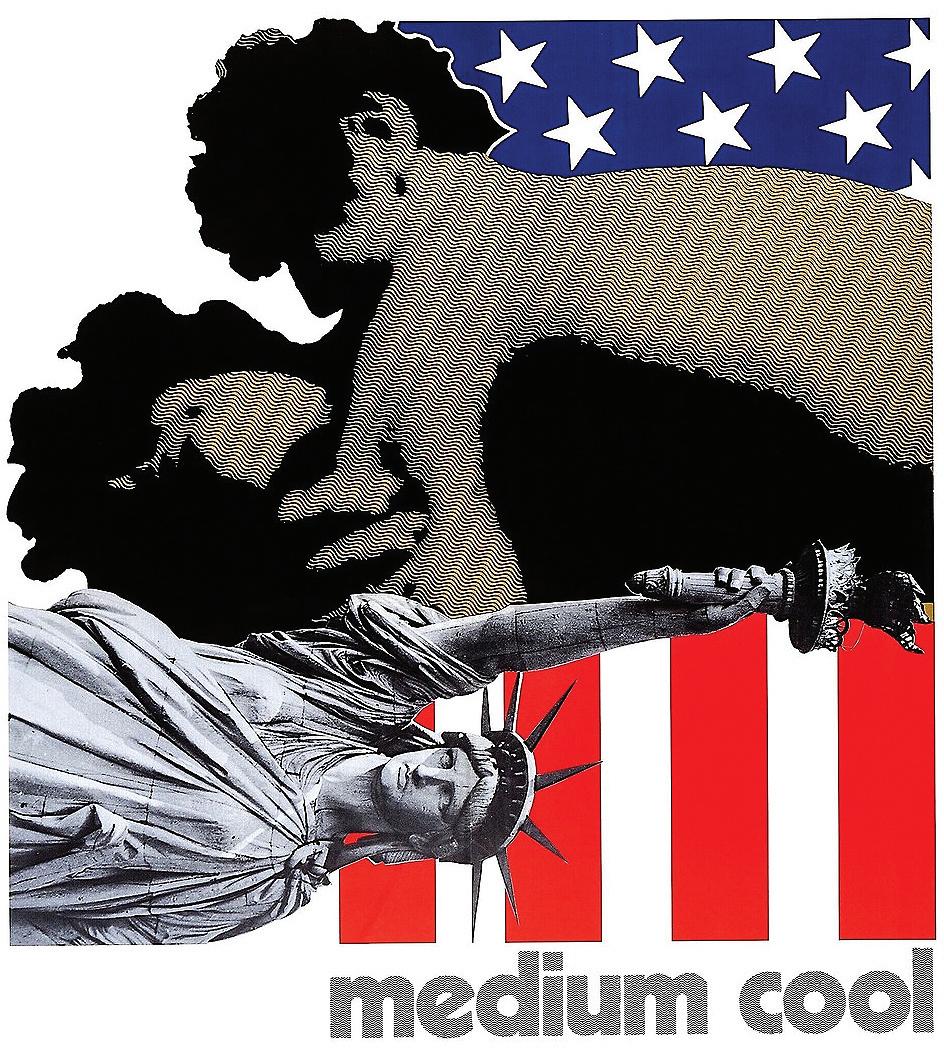
The anti-Vietnam War movement originated the phrase, “The whole world is watching,” which we hear echoing at the end of Wexler’s film, as people protested and were beaten and arrested. In the documentary Look Out, Haskell, It’s Real (2001), Wexler discusses the way the movement began to operate within media narrative structures: “The whole idea of presenting ideas in dramatic, theatrical ways was something the anti-war movement knew very well [...] to get the attention of the media. [...] Everyone’s putting on a show for somebody. In our culture, if you’re not on television, you don’t exist.”
In the film, Casselis engages with the world through the camera, and we’re reminded repeatedly of the disconnect and the inherent violence it creates. At one point, we watch Casselis and Eileen listen to Dr. King’s “I’ve Been to the Mountaintop” speech; as Eileen looks in awe, Casselis says: “Jesus, I love to shoot film.” As they continue talking, Eileen
ponders, “Seems like no man’s life’s worth anything anymore.” Then Casselis explains that the media has a script, a “national drain-off” that quells the masses during times of tragedy or civil unrest. This script shows the timeline of events and national response in a packaged way, then “experts [say] how sick our society is, how sick we all are,” and, when the script is over and the week ends, “everybody goes pretty much back to normal. [...] You know, ‘normal.’”
This has become particularly stark as social media has become the primary mode for viewing violence and genocide, accessing information, and interacting with movements. TikTok, X (formerly Twitter), and Instagram seemingly narrowed space between people, moving people away from packaged news narratives to stories straight from the people seeing or experiencing a situation. While this has allowed people to hear from others directly, some have argued that these changes have further desensitized people to images of violence.
At another point in the movie, Casselis follows the story of Frank Baker (Sid McCoy, famous Soul Train announcer) a Black cab driver who, in an earlier scene, turns in $10,000 he found in his car to the police, who proceed to question and berate him. When they go to interview Frank, the newsmen are met with a house full of people, credited as “Black militants,” played
& SCREEN
by figures such as Jeff Donaldson and Barbara Jones-Hogu, two of the founders of AfriCOBRA (African Commune of Bad Relevant Artists), a Chicago-based collective of Black revolutionary artists; Kuumba Theatre founder Val Grey Ward; and musicians Muhal Richard Abrams and John Shenoy Jackson of the Association for the Advancement of Creative Musicians.
Like all of Medium Cool, this scene is partially scripted but mostly improvised; in an interview with Roger Ebert, Wexler said the people in the scene only agreed to be in it if they could speak honestly about the ways the media treats Black people. “When you come in here, and you say you come to do something of human interest, it makes a person wonder whether you’re going to do something of interest to other humans, or whether you consider the person human in whom you’re interested,” says one man, directly to the camera.
In the only non-improvised quote in the scene, another man says, “Why don’t you find out what really is? Why do you always got to wait for somebody to get killed, man? Because someone is gonna get killed!”
The film begins and ends with two fictional car crashes and, while the whole film resonates, these bookends feel eerily aware of the shift in media we’ve now experienced: we’re all the detached Casselis, not only watching tragedy on our screens but capturing it ourselves. The first scene shows Casselis and his soundman filming a severe car crash off a highway exit. The horn is blaring (which the soundman turns off for his audio) and a woman’s body lays out of the side of the car. The only indication she may be alive is a small, indistinct groan. As the men leave the scene to drive away, they consider calling an ambulance as an afterthought.
At the end of the film, you hear a news voiceover of Casellis and Eileen crashing their car before you witness it yourself. Moments later, a young boy takes a picture of the smoking car while the car he’s in continues past the crash. It’s no longer just designated cameramen capturing these images, we dissociate ourselves from the violence and our accountability in it. ¬
Savannah is the director of fact-checking and writer with the Weekly
Dozens of Arrests at Pro-Palestine Protests During DNC
Multiple marches, an Israeli consulate demonstration, and sit-ins outside the United Center were among the protests calling for Democrats to stop arming Israel.
BY MAX BLAISDELL
As thousands of buoyant delegates applauded the dozens of speeches made during the four days of the Democratic National Convention (DNC) this week, thousands of pro-Palestinian protesters flooded Chicago’s streets to show they were not forgetting Gaza nearly a year after the conflict began.
Along the Magnificent Mile on Thursday, the final day of the convention, protesters chanted “Free Palestine” and rang cow bells as delegates boarded buses outside their hotels heading to the United Center. Outside the Israeli consulate near Ogilvie Transportation Center, several rabbis waved signs bearing anti-Zionist slogans while office workers in nearby skyscrapers watched and took videos on their phones.
And in Union Park, thousands of protesters—young and old, Black, white, Arab, Filipino and Latinx, cis and trans, able and disabled—showed up to vent their anger and frustration with the Democrats for sending billions of dollars in military aid to Israel amid its ongoing war in Gaza following the killing of 1,200 people and the kidnapping of 250 hostages by Hamas militants on October 7.
Since then, the conflict has claimed more than 40,000 Palestinian lives, many of them women and children, according to the Gaza Ministry of Health.
On Monday night, President Joseph Biden acknowledged the protesters “out on the street” in his convention speech, saying, “they have a point.”
Regarding the war in Gaza, Biden said, “A lot of innocent people are being killed, on both sides.” He added that his
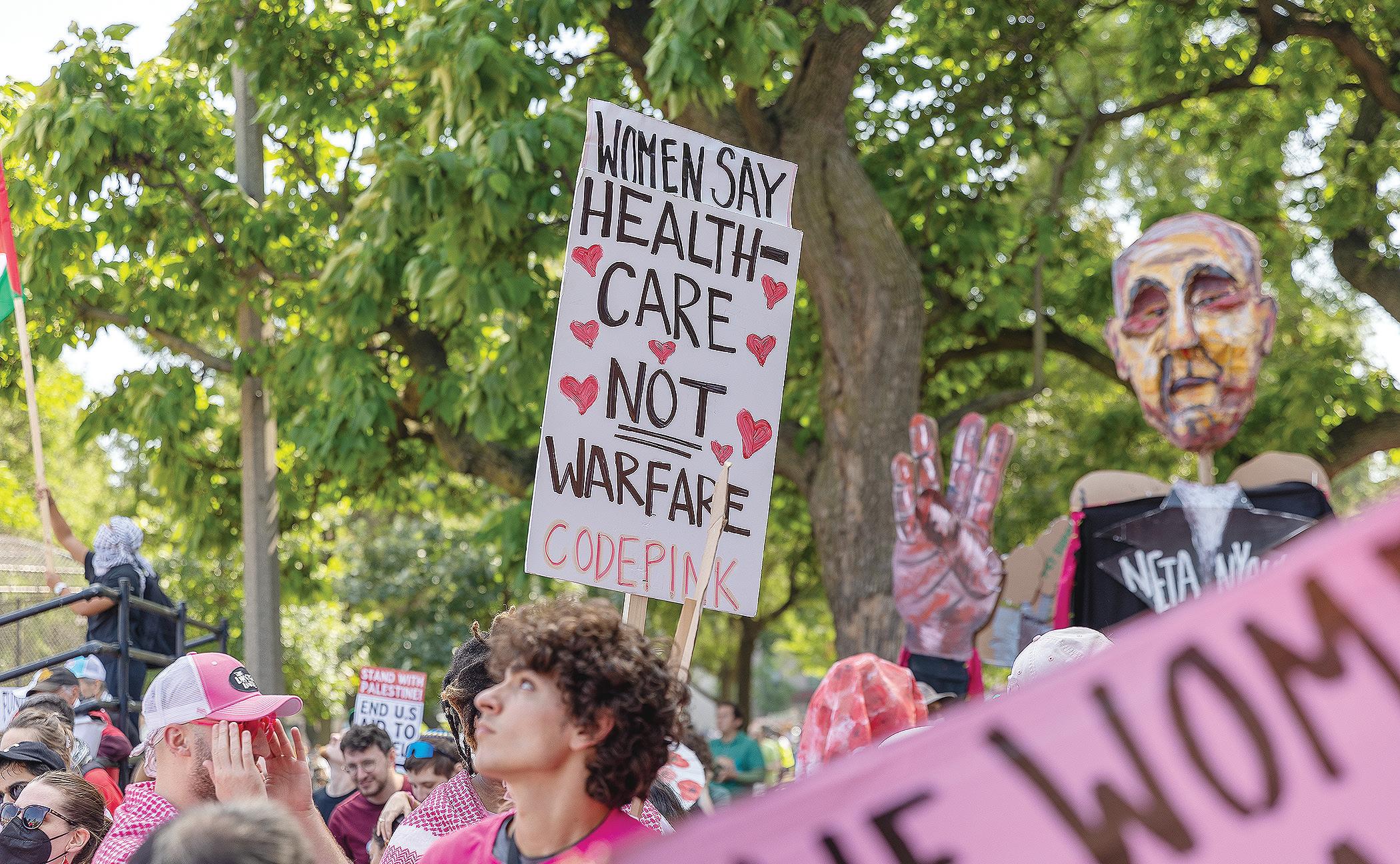
administration is working to deliver more humanitarian aid to Gaza and pressing for a ceasefire to bring an end to the conflict.
Faayani Aboma Mijana, a a member of the Chicago Alliance Against Racial and Political Repression (CAARPR) and spokesperson for the coalition that organized Monday’s demonstration, said that the protests were meant to send a message to the Democratic Party’s leadership that they risk losing a significant portion of the electorate without an immediate ceasefire to the war in Gaza and an end to U.S. aid to Israel.
“We want action. We don’t want platitudes,” Mijana said. “And we’re finding that the best way to get action is to build a mass movement and force them to do it.”
CAARPR is one of more than 250 organizations that were a part of the
Coalition to March on the DNC. Others included Students for Justice in Palestine, American Friends Service Committee and Jewish Voice for Peace Chicago, all which took part in demonstrations throughout the past year.
“It is a matter of historical urgency that all organizations who fight for the rights of working and oppressed people in the U.S. join us in this demonstration to stand in solidarity with Palestine,” the coalition said in a statement last month.
Mijana likened this historical moment to 1968, when large-scale demonstrations were held outside the DNC in Chicago to protest the Vietnam War. Protesters’ slogan that year was: “The whole world is watching.” That year, the world witnessed widespread images of demonstrators bludgeoned by police batons in what would
later be described as a “police riot.”
A whirlwind of major political developments occurred in the weeks leading up to this year’s DNC, almost as head-spinning as 1968. That April, the assassination of civil rights leader Dr. Martin Luther King Jr. set off massive uprisings across the nation, including the West Side of Chicago. Just days before, President Lyndon B. Johnson announced he would not seek reelection, and presidential hopeful Senator Robert F. Kennedy was assassinated at a campaign event in California later that summer.
This year, on July 13, former President Donald Trump survived an apparent assassination attempt at a campaign rally in Pennsylvania, just days before receiving his party’s formal nomination for president at the Republican National Convention in Milwaukee. One week later, Biden announced he was dropping out from the race after a period of intense pressure from Congressional Democrats to do so following his disastrous debate performance against Trump.
Hatem Abudayyeh, the chair of the U.S. Palestinian Community Network (USPCN) and a spokesperson for the Coalition to March on the DNC, said the protests targeted the convention in Chicago because Democrats control the White House and the country’s foreign policy.
“Tens of thousands are here because the Democrats are in power,” he explained. “It’s Biden and Harris and Blinken and all of those senators who are responsible for the deaths and the blood of 40,000 Palestinians.”
Abudayyeh rejected the notion that
"Women say healthcare not warfare" sign during a march on Monday, August 19, 2024. Photo by Jesus Montero
Democrats represent “the lesser of two evils,” despite Republicans’ support for Israel during its military campaign and Democrats’ public criticisms.
“We recognize the evils of Donald Trump. Everybody does. Nobody wants him to be president,” he said. “But the Democrats have been taking Black and Latino and Mexican and Arab and Muslim and Palestinian communities for granted in this country for decades.”
Abudayyeh said his disillusion with Democrats goes back multiple administrations, dating to the 1990s.
“We have not seen anything from Clinton or Obama or Biden that has proven to us that the Democrats are more fair or more balanced in their treatment of the issue,” he said.
Over the last thirty years, Israel has constructed more than 100 settlements across the West Bank, home to some 500,000 settlers. Attacks by Israeli settlers and religious nationalists on Palestinians are frequent and have grown more common since October 7.
Former Presidents Bill Clinton and Barack Obama spoke at the DNC. On Tuesday, Obama did not mention Palestine. Clinton, who nearly struck an IsraeliPalestinian peace deal in the final days of his presidency, called for peace in the Middle East.
Since October 7, Abudayyeh said that the coalition’s organizations have partnered on more than a dozen protests in Chicago, all of which drew thousands.
On Thursday, several thousand marched through the Near West Side ahead of Vice President Kamala Harris’s acceptance speech. As the demonstration looped down Harrison, up Damen, and back to Union Park along Lake, phalanxes of helmeted police surrounded protesters at every turn, blocked off side streets and blanketed El platforms.
Many of the previous protests made Biden the principal target of their vitriol. Abudayyeh said that it made no difference to protesters that Harris is now the Democratic nominee.
“Kamala Harris is a representative of the administration,” he said. “She’s part of the policymaking when it comes to Palestine and Israel and Gaza. She is complicit in the genocide. She has blood on her hands like Joe Biden does.”
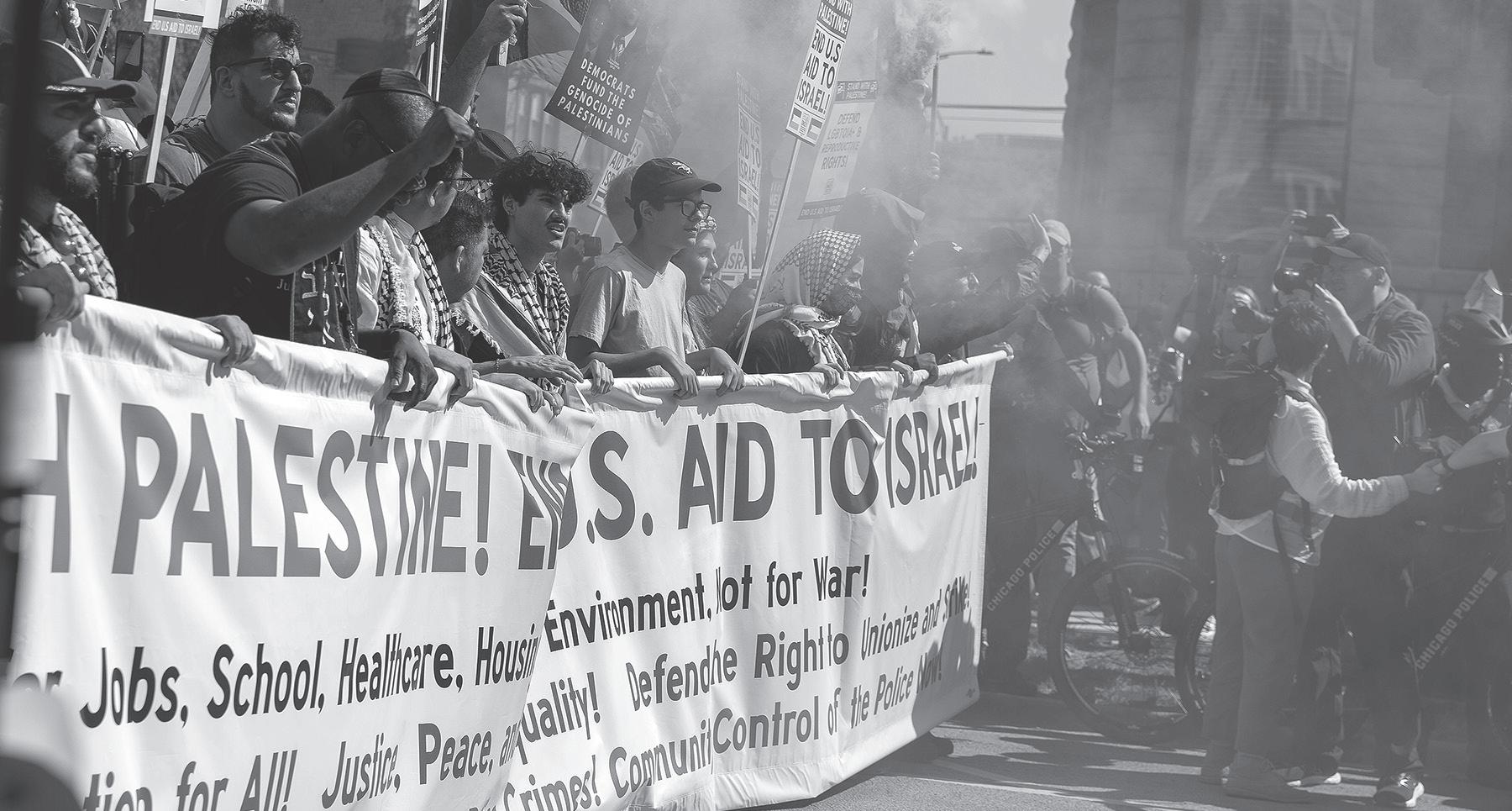
In May, Biden presented a three-phase proposal for a ceasefire based on the Israelis’ previous negotiating position. It has yet to come to fruition. The week before the DNC, the administration renewed its push for a ceasefire deal between the parties while greenlighting $20 billion in arms sales to Israel.
Abudayyeh thinks that regardless of whether a ceasefire-for-hostages deal happens before Election Day in November, public opinion towards Israel has changed irrevocably. Similar to the pressure South Africa faced in the 1980s, he thinks an international consensus is building against Israel operating as an “apartheid state” under the government of Benjamin Netanyahu.
“Even in the United States,” he said, “Israel is [now] recognized as the state that the Palestinians call it: a white settler, colonialist, racist, apartheid, Zionist state.”
Ahead of the DNC, CPD superintendent Larry Snelling tried to assuage concerns that 2024 could be a reprisal of 1968, when CPD officers indiscriminately attacked anti-war protesters, journalists, and bystanders in a police riot.
“We will not allow people to come here and destroy this city,” he said.
Snelling was frequently front-andcenter at protests, coordinating the massive police response to them all week. Hundreds of police officers flanked the marches and demonstrations in endless shoulder-toshoulder lines.
CPD arrested seventy-six protesters last week, according to the National Lawyers Guild (NLG) Chicago chapter,
whose members were on hand to monitor the police response at each of the protests. The majority of the arrests occurred Tuesday night at a protest outside the Israeli consulate, where about 200 activists were met by far greater numbers of police.
Kevin Sullivan came from South Florida to take part in Tuesday’s protest, which was organized by Behind Enemy Lines, a self-described “militant antiimperialist” group founded after the 2020 George Floyd rebellions. During the protest, activists burned a joint American/ Israeli flag and yelled obscenities. Sullivan said the police made the situation dangerous by deliberately confining demonstrators to narrow spaces, a tactic known as “kettling.”
“It’s something that really creates a risk of people getting seriously injured,” he said.
Towards the end of the protest, Sullivan got trapped between a swarm of riot police and a line of bicycle cops as activists tried to escape up Canal Street.
“It was really packed in there,” he said. “It was scary.”
Sullivan was ultimately able to leave the scene, but dozens of protesters and at least two journalists were arrested. At a press conference the next day, Superintendent Snelling said the journalists had been “too close” to protesters.
The Nation later reported that Tom Ahern, CPD’s assistant director of news affairs, “forcefully” removed photojournalist Josh Pacheco’s press credentials. A CPD spokesperson told the Weekly that the credentials “were taken in the process of an arrest, and they were returned the next day to a lawyer.”
Pacheco, whose credentials were
issued by New York’s Mayor’s Office, told the Weekly that while they were being loaded onto a police wagon, Ahern “made the calculated decision to violently rip my credentials off my person,” pulling some of the photojournalist’s hair out in the process. “It was through the tireless efforts of journalists, photographers, and media lawyers that my credentials were located, sent to my lawyer’s office, and returned to me nearly twenty-four hours later,” Pacheco said. “None of this is right.”
“The massive shows of force and very aggressive posture toward First Amendment-protected activity, including the deliberate obstruction of a Palestine solidarity march from the Israeli consulate on Tuesday, indicated an intolerance to people’s free speech rights,” said Madeline Townsend, a member of the Chicago chapter of the National Lawyers Guild (NLG). “Police far outnumbered protesters on Tuesday, indiscriminately arresting people and often surrounding and corralling groups before conducting mass arrests.”
In a statement, NLG Chicago said four arrested protesters required hospitalizations, including two as a result of injuries sustained at the hands of police. Snelling confirmed the first figure while claiming several officers were injured in the course of the protests but that they refused medical treatment because they wanted to remain with their fellow officers.
The Civilian Office of Police Accountability, a police-oversight agency that investigates allegations of police misconduct, said it had received eight DNC-related complaints as of press time. Two were for excessive use of force by officers and two alleged civil rights violations.
At a press conference on Friday, Snelling commended his officers for keeping the city safe while protecting First Amendment activity.
“Right now, I’m living in the glow of the work that these police officers did,” he said.
Snelling claimed they showed restraint in the face of goading by protesters.
“We saw people yelling in their faces, yelling obscenities, and they maintained their cool throughout, they didn’t take the bait,” he said. “So again, please, can we stop talking about 1968?”
Protesters march on Monday, August 19, 2014.
Photo by Jesus Montero

POETRY FESTIVAL ECOS:



Getting the march to within blocks of the United Center was a long and arduous fight for Abudayyeh and the coalition, which wrangled with the City for months over the location and length of the demonstrations in federal court. Negotiations about sound and stage equipment continued until the week before the DNC. Ultimately, the coalition was allowed to march from Union Park to Park 578, which has a direct line of vision to the United Center, and then back to Union Park along Lake Street.
While some residents along the route greeted the protesters with Palestinian flags showing their support, others weren’t so enthusiastic. Lester Smith, a sixty-eightyear-old Black man who lives along the march route, was upset the march was funneled down his residential block. And because of road closures due to the protests, he was unable to get food and medication delivered to his home.




“The United Center’s what, four blocks from here? Doesn’t make any sense,” he said.
speech on Monday, several Jewish and Muslim “uncommitted” delegates unfurled a banner in the arena reading “Stop Arming Israel.” Other delegates covered the banner with signs before snatching it away. On Wednesday, as Harris’s running mate Tim Walz spoke, a group of Jewish and Muslim uncommitted delegates began a sit-in outside the United Center to demand a Palestinian be allowed to speak at the DNC. Harris’s team steadfastly refused to do so.
“It’s so important to appease the pro-war forces in our country that are making money off of the killing of babies in Gaza that [Harris] won't let even a Palestinian American speak from this stage,” said Abbas Alawieh, a self-described “ceasefire delegate” from Michigan who took part in the sit-in. He predicted that the Democrats’ decision to “suppress the voices of Palestinian Americans” will prove unpopular with voters.



























The pro-Palestinian rallies were also met by counter-protesters, some of whom were bent on disruption, others in soaking up the media spotlight.
On Monday, Mark Julian, a Chicagobased pastor, held up an Israeli flag at a small pro-Israel rally on the edge of Union Park. A line of bicycle police protectively surrounded them.











































The pro-Palestine demonstrators “have a right to do what they’re doing, but we have a right to stand up to have a counter opinion,” Julian said.
Harris briefly acknowledged the war on Gaza toward the end of her acceptance speech. After affirming that she would “always ensure Israel has the ability to defend itself,” the Vice President said, “At the same time, what has happened in Gaza over the past ten months is devastating,” adding that she and Biden “are working to end this war, such that Israel is secure, the hostages are released, the suffering in Gaza ends and the Palestinian people can realize their right to dignity, security, freedom and self-determination.”
Husam Marajda, a member of USPCN, said the massive demonstrations made Palestine “impossible to ignore” at the convention.









Julian said Israel has a right to defend itself because it was “attacked first” on October 7, and that if Hamas would surrender, the war could “end tomorrow.” He claimed the “Jewish State has always been over and above helping the Palestinian people.”









In May, the UN reported that the scale of destruction in Gaza hasn’t been seen since World War II and that it would take until 2040 to rebuild the homes flattened by Israel’s assault. “I know that [Israel] would help them in a heartbeat rebuild Gaza,” Julian said.
Despite the clamor about Gaza outside the United Center, there was little mention of it within. During Biden’s
“The DNC would have loved to just talk about Trump and how great of a president Biden is, but guess what: all of the media couldn’t stop talking about the genocide on Palestine this week because of our organizing,” he said. “And we’re going to keep organizing until U.S. aid to Israel is ended and Palestine is free.” ¬
Max Blaisdell is a fellow with the Invisible Institute and a staff writer for the Hyde Park Herald
Federal Lawsuit Alleges Chicago Police Beat Migrants Seeking Work at Home Depot
Criminal trespassing arrests have skyrocketed at a Southwest Side Home Depot as recently arrived migrants seek work, and day laborers say they’re being mistreated as a result.
BY SEBASTIÁN HIDALGO, CITY BUREAU
This story was originally published by City Bureau, a Chicago civic journalism lab. Printed with permission.
Five recently arrived migrants say criminal trespassing enforcement at a Southwest Side Home Depot has escalated to alleged physical assaults by security personnel, including multiple offduty Chicago Police officers.
The allegations are at the heart of a federal lawsuit filed at the beginning of August, which names two Chicago police officers, two Home Depot employees, and other unnamed security personnel and police officers, in addition to the city and Home Depot, as defendants. In the course of its six-month investigation into the treatment of migrant laborers, City Bureau learned of the pending suit.
The five migrants were choked, thrown around, punched, slapped and otherwise struck after they were handcuffed and brought into a security room at the Home Depot, the lawsuit alleges. The incidents took place between October and May, involving Venezuelan and Colombian migrants between 26-45 years old. Each individual plaintiff endured xenophobic and racial insults while detained by off-duty CPD officers and Home Depot security, the lawsuit states.
“These abuses, while horrifying, are not new,” the lawsuit states.
Four of the five either were not charged, or had criminal trespassing charges later dismissed in court, according to the lawsuit. The fifth man had a court hearing scheduled in August.
In the federal lawsuit, filed August 6 by Raise the Floor Alliance and the People’s Law Office, Latino Union of Chicago joined with the five migrants in
alleging off-duty Chicago police violated the migrants’ constitutional rights against excessive force, unlawful search and seizure and detention; and accusing officers and Home Depot employees of conspiring to deprive them of those rights, false arrest and malicious prosecution based on the migrants’ country of origin.
The lawsuit also accuses the Chicago Police Department and Home Depot of working together to interfere with the day laborers’ right to seek work, with the city allegedly signing off on Home Depot recruiting additional off-duty Chicago police officers beginning in October, when a greater number of Venezuelans began showing up at The Home Depot at 4555 S. Western Blvd., it states.
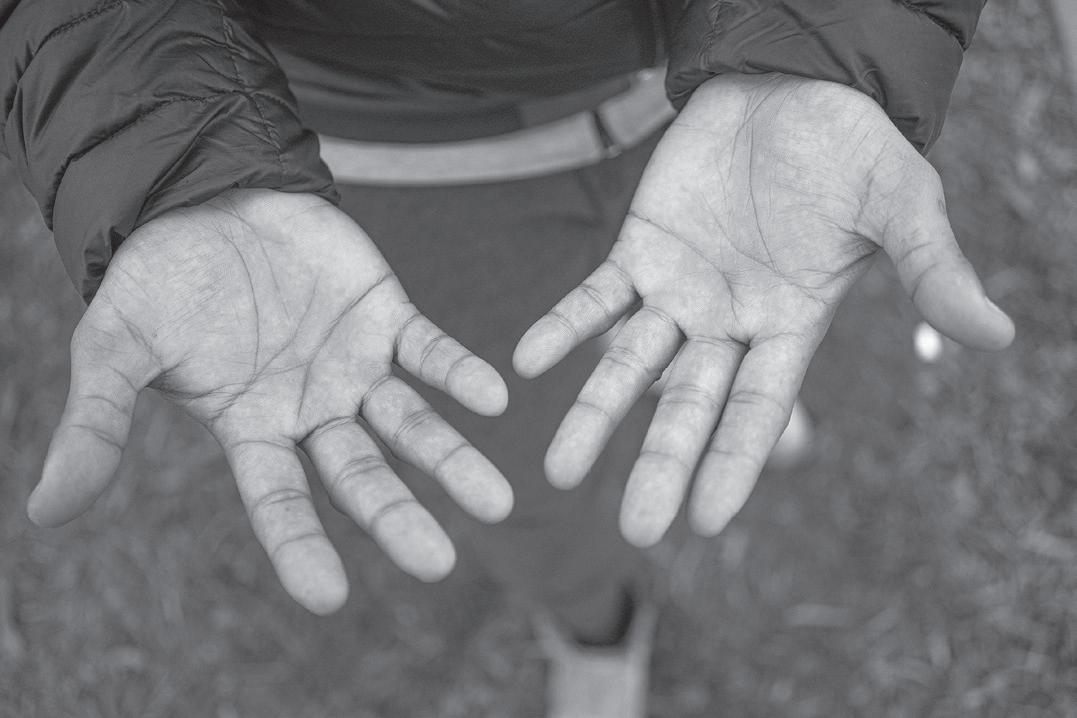
In response to the allegations first detailed to City Bureau in the spring, both Home Depot and the Civilian Office of Police Accountability launched investigations. As of July 24, the COPA investigation was still in progress, according to a spokesperson.
Mayor Brandon Johnson’s office pledged in April that every allegation of police misconduct would be “thoroughly investigated” and misconduct would be “swiftly addressed and adjudicated.”
In April, Home Depot said its internal investigation found no evidence the allegation against its security personnel took place on company property. The company enforces a non-solicitation policy, it said in an email.
“This is a complex community issue, and we cooperate with local law enforcement officials in addressing trespassing issues on our property,” a Home Depot spokesperson said in an April 24 statement.
Luis, a 29-year-old day laborer, had been frequenting the Home Depot parking
lot since arriving in Chicago just over a year ago, hoping to earn enough cash to pay for rent and eventually open his own small business.
In a 26-second video clip obtained by City Bureau and recorded by a fellow day laborer, Luis is seen on the ground before two men pull him up by his arms, place him in handcuffs, and walk him toward the Home Depot building. One of them wears a dark-colored vest bearing a “POLICE” patch on the back and an embroidered star on the front. This vest, known as an overshirt carrier, is in line with uniform specifications laid out in CPD directives.
Luis, who requested his last name be withheld because he feared retaliation for speaking publicly about the alleged assault, told City Bureau he did not see the trespassing signs and received no verbal warning before he was dragged into a security room and allegedly beaten by an
off-duty police officer working security at the hardware big box chain Jan. 10.
“When I was in the room, he hit me on the ribs and the chest like four or five times,” Luis said in Spanish. “They grabbed me like I was a doll. He threw me, and I flew, saying, ‘Oh God, what’s going on?’”
When arresting officers arrived at the scene, the off-duty officer told them he had given Luis prior verbal warning earlier in the day before Luis returned and was detained, according to the arrest report. Luis denies he received that prior warning, but he was still arrested and charged with criminal trespassing.
Trespassing arrests are a risk migrant day laborers increasingly face in Chicago as they maneuver the challenge of obtaining legal work authorization—a process that typically takes at least six months and can take more than a year.
In the interim, many look for work in Home Depot parking lots—and are often the target of trespassing arrests as they do so, deterring them from scraping out a living with daily gigs in construction, demolition or other physical labor.
But as more than a dozen day laborers say they’ve been verbally harassed or physically assaulted, labor advocates are taking legal action.
“Seeking happy [and] healthy lives should be something that anybody [who] resides in the city should be able to do. Unfortunately, a lot of those things … are criminalized,” said Miguel Alvelo Rivera, executive director of Latino Union of Chicago, a community-based worker center that organizes day laborers and household workers. “In situations like this, we see the seeking of work as a crime, surviving as a crime—because of who is trying to do it.”
A day laborer displays his hands on May 18, 2024, to show the calluses of daily construction work. Many day laborers do not qualify for work authorization and rely on the daily gig work contractors provide.
Photo by Sebastián Hidalgo/for City Bureau
Off-duty allegations
In the second alleged incident detailed in the lawsuit, Alfonzo Gabriel Arias, 26, was asked to leave the Home Depot parking lot Dec. 27 and complied, his lawyers said.
After moving to the public sidewalk, Arias was approached by three men, including off-duty police officer Eric Gaytan, the lawsuit alleges. The two others also wore vests marked “POLICE,” according to the complaint.
One man threw Arias to the ground before he was handcuffed and “forcibly dragged” into the store and taken to a room, according to the lawsuit. While still handcuffed, he was shoved into a bench; struck in the face, ribs and stomach; and choked as the men laughed and threatened to have him deported, the complaint states.
At one point, one of the men told the man choking Arias to stop or “he would kill Mr. Arias,” according to the lawsuit.
Gaytan’s badge number corresponds with two past Bureau of Internal Affairs cases and one Civilian Office of Police Accountability complaint. The complaints involve an arrest without providing Miranda Rights to a complainant, and failing to properly investigate an incident, according to a COPA response to a Freedom of Information Act request. One complaint is still under investigation; two have been closed, according to COPA documents.
Along with Luis, several migrants point to off-duty officer Angel Martinez as being one of the main aggressors in the physical assaults at the Home Depot, they told City Bureau.
“I’ve met other people who were assaulted by the same person who assaulted me,” Luis said in Spanish to City Bureau.
Martinez is also listed as the complainant on Luis’ arrest report. The federal lawsuit only directly connects Martinez by name to Luis’ arrest.
In additional videos and screenshots recorded in December and May, along with the one showing Luis’ arrest, Martinez wore a dark-colored vest sporting an embroidered star and his name patch while working at the store. Characteristics of the vest are consistent with CPD directives regulating embroidered patches. City Bureau reporters also spoke to Martinez in person at The Home Depot and observed
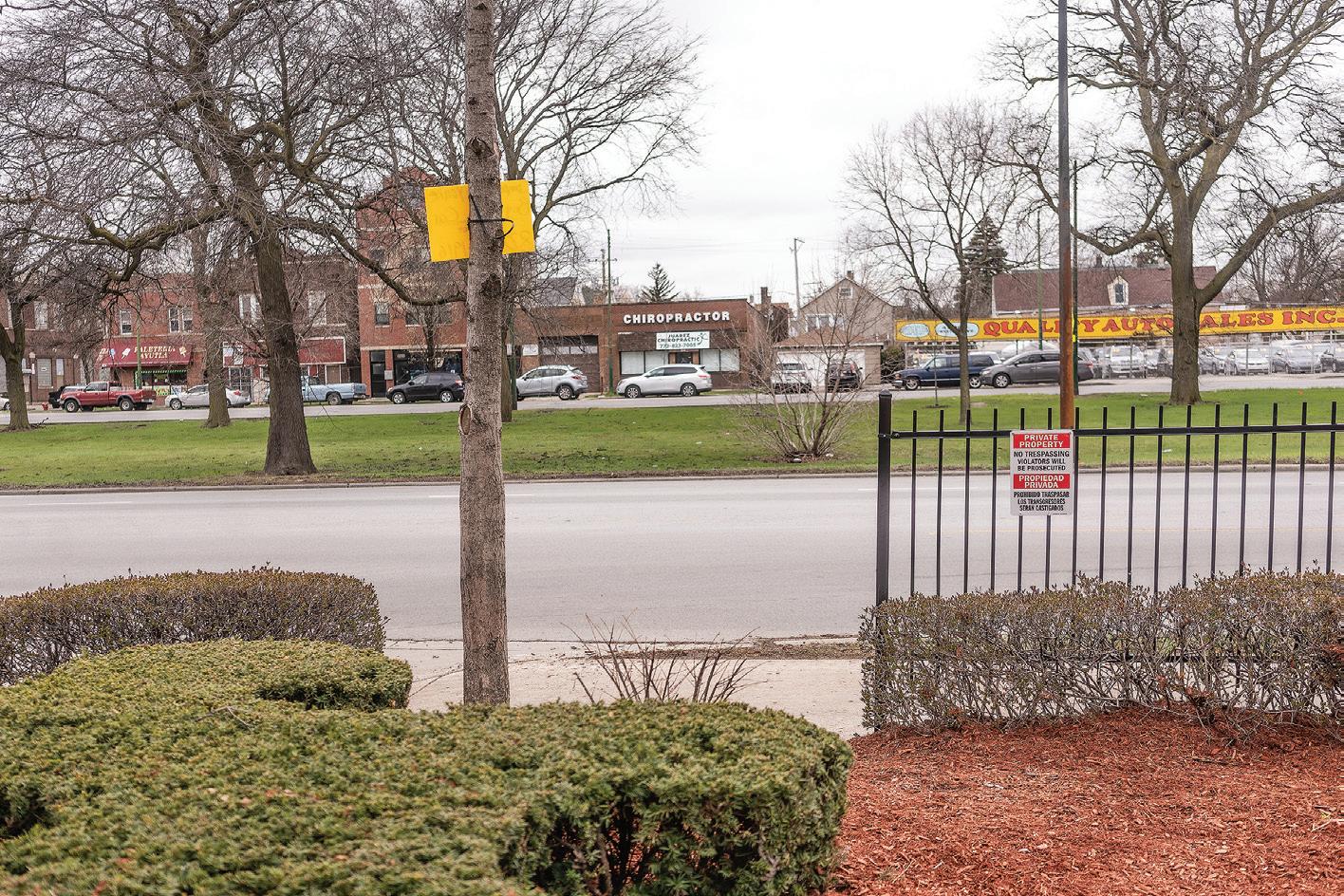
him wearing his CPD badge number.
That badge number corresponds to 13 Bureau of Internal Affairs and COPA complaints against Martinez, according to CPD and COPA documents obtained through a Freedom of Information Act request.
Five of the complaints are still under investigation, including the Jan. 10 incident involving Luis at the Southwest Side Home Depot. Two of the 13 complaints against Martinez were sustained—resulting in additional training and a reprimand in 2019.
Martinez was a defendant in a federal civil lawsuit concerning false arrest and seizure, and malicious prosecution. The lawsuit was ultimately settled and dismissed in May 2023.
Martinez declined to comment in person and through Chicago police media affairs.
‘Selective
enforcement’
Public records show trespassing arrests have increased significantly at The Home Depot at 4555 S. Western Blvd. The uptick came after trespassing signs were posted some time after November 2022, according to an analysis of Google Street View images. This coincides with the arrival of the first bus carrying migrants from the Texas border to Chicago, on Aug. 31, 2022, according to the city.
For someone to be found guilty of criminal trespassing in Illinois, they must first be warned that their presence is forbidden, either verbally or in writing, which can include a “no trespassing” sign posted at the property’s main entrance.
If they remain on the property or
return, they can be charged with trespassing, a misdemeanor that can carry a punishment of up to six months in prison and a fine of up to $1,500.
At the Western Boulevard location, the signs, posted in English and Spanish, are small and located approximately 12 feet above the ground on every light pole in the parking lot, with at least one near the entrance and several along the gate framing the parking lot.
As more than 45,000 migrants arrived via Texas buses and airplanes to Chicago over the past two years, conflicts with police are turning violent and feel discriminatory toward the largely Venezuelan population of recent arrivals, according to City Bureau interviews with more than a dozen day laborers.
The accusations of mistreatment known to City Bureau stem from the Western Boulevard Home Depot, which is located near the borders of the New City, Back of the Yards, and Brighton Park neighborhoods.
Criminal trespassing enforcement has skyrocketed there since August 2023, according to a City Bureau analysis of Chicago Police Department data. From 2002 to 2022, a total 31 arrests took place there, averaging 1.4 arrests per year. In 2023, 24 arrests took place, all within the last five months of the year—over 16 times the previous 20-year average. The rate of arrests continued to outpace previous years in the first few months of 2024, according to CPD data.
Of those arrested for trespassing at the Home Depot site from Aug. 18, 2023, to March 25, 85% were Venezuelan, although the country of origin was unknown for seven of the 34 arrests.
Four of the plaintiffs in the lawsuit are Venezuelan. The fifth, Betuel Castro Camacho, is Colombian, but was told he “was lying and that he was Venezuelan” while three security personnel allegedly assaulted him inside a room on the western side of the Home Depot, the lawsuit states.
“The selective enforcement of criminal trespassing laws against migrants when they are seeking work as day laborers is a means of criminalizing a person’s status for simply being a migrant,” said Kathleen Arnold, director of DePaul University’s refugee and forced migration graduate program.
“It’s a misunderstanding of why they are in Home Depot parking lots in the first place,” she said. “These individuals seek work, which is a life-sustaining function, not criminal activity.”
Arnold said she believes this amounts to discrimination based on perceived nationality, because the police statistics indicate significant selective enforcement of trespassing based on country of origin.
“That amounts to racism, because you’re assuming that because they’re from Venezuela, they must be committing a crime,” she said.
‘A very specific kind of racist interest’
Five additional recently arrived migrants told City Bureau they have been verbally harassed by Home Depot security personnel and what appear to be offduty officers wearing body armor vests labeled “POLICE.” Off-duty officers are sometimes contracted by third-party companies to work as security personnel at The Home Depot, a practice allowed within the CPD guidelines for secondary employment.
In a March 27 video obtained by City Bureau, security personnel shout in English and Spanish as they approach a group of mostly Venezuelan day laborers standing on the sidewalk adjacent to the hardware store’s parking lot—public property beyond the store’s property line.
“F— off, get out of here,” they jeer. “Get the f— out. I don’t care that you are recording.” They call the day laborers pendejos, Spanish for “idiots.”
Alexander, who recorded the video and requested his last name be withheld out of fear of being targeted by law and immigration enforcement, has been frequenting the Home Depot hiring site
A trespassing sign is posted along a fence at The Home Depot adjacent to Western Boulevard entrance, May 28, 2024. There are multiple trespassing signs posted on light poles along the store's parking lot.
Photo by Sebastián Hidalgo/for City Bureau
since late 2023. While migrants from other countries—Mexico, Colombia, Honduras and Ecuador—cluster in other parts of the parking lot, he said he believes the security personnel are specifically targeting Venezuelans.
The latest incidents follow a longstanding pattern of using trespassing charges or other means to target migrant workers in the Chicago area.
In 2003, then-Ald. Margaret Laurino (39th) forced day laborers to vacate a defunct CTA bus station in Albany Park. When the station was ultimately demolished, local advocates accused Laurino of race-based motivation for the teardown and subsequent displacement of the mostly Latino workers.
A few years later, Home Depot officials in west suburban Cicero called police on day laborers, which, according to a 2005 Chicago Tribune report, kicked off a chain of 55 arrests for misdemeanor trespassing.
In 2007, the Chicago Committee For The Right to Work filed a federal lawsuit against Chicago police, the city and a business owner on the grounds of false arrests, wrongful detention and imprisonment, and a violation of First Amendment rights after three men were arrested for trespassing on a manufacturing company’s site, which day laborers frequented.
The civil lawsuit was ultimately dismissed in court.
Trespassing enforcement used against migrants follows a pattern in the United States, said Kevin Herrera, legal director at Raise the Floor Alliance, a Chicago-based workers rights organization and law office.
He said enforcement is typically on “private property with poor signage, where people reasonably believe that places like a Home Depot parking lot are open to the public because customers come and go as they please.” The rules are selectively enforced, “which reflects a very specific kind of racist and xenophobic interest,” he added.
Certain day laborers, such as older Mexican workers, are seemingly unaffected by the harassment from Home Depot security personnel, migrants and advocates said.
“Then rules are selectively enforced for arbitrary reasons, usually centered around which people are deemed acceptable and which people are not,” Herrera said.

incidents underscore a wave of escalation in both the targeting of migrants looking for work, and in the violent response by sworn police officers hired as security personnel, a form of secondary employment commonly known as “moonlighting.”
A 2017 joint investigation by the Chicago Reporter and CBS-2 into moonlighting found that out of the nation’s 50 largest municipal and county law enforcement agencies, CPD had the weakest oversight on officers’ secondary employment statutes. The report found that CPD was the only one of the 50 departments that does not require its officers to get permission to work a second job.
Instead, CPD asks officers to disclose secondary employment to supervisors on an honor system, and will only investigate incidents once a formal complaint is made, according to a 2014 Board of Ethics document. The ruling also notes that CPD prohibits outside employment where “a use of official police authority is a condition of secondary employment.”
A U.S. Department of Justice investigation into CPD in 2017 found “a significant amount of alleged officer misconduct involves officers working secondary employment.” A 2017 report by Chicago’s Office of the Inspector General also found potential risk for officer burnout and legal exposure.
CPD’s lack of secondary employment oversight contributed to the abuses of day laborers by off-duty police officers at the Western Boulevard Home Depot store, said Raise the Floor’s Herrera.
“It’s really a travesty that it has taken getting to a place like we’re at now for the city to take material steps to limit what off-
duty police officers can do when working in private employment,” Herrera said.
Off-duty officers working second jobs still need to follow the CPD rules of conduct, which say officers must identify themselves by name, rank and star number upon request; avoid unnecessary verbal and physical confrontation with anyone, excessive use of force, and physical or verbal maltreatment of any citizen.
It is also against state law for off-duty officers working security to imply they are an employee of a government entity such as CPD; to wear a badge, identification card or police emblem; or wear uniforms with the words, “police,” “sheriff,” “highway patrol,” “trooper,” or “law enforcement” while on the job.
City-backed solutions
As for the larger question of how day laborers can safely solicit employment in private business with strict solicitation policies like at the Home Depot parking lots, the city can do more, said Alvelo Rivera, executive director of Latino Union of Chicago.
“We believe that there is not only potential, but a need for the city to respond to the situation,” he said.
There are no city-supported hiring centers for day laborers in Chicago. However, Alvelo Rivera points to a cityfunded job center in Pasadena, California, and a city-run day labor center in Plano, Texas, as examples of city-supported options.
In 2000, the Instituto de Educación Popular del Sur de California and the National Day Labor Organizing Network established the Pasadena Community Job Center with the support of a $140,000 city grant to help day laborers find employment.
The center “is one of the top worker
centers in the country,” said Nik Theodore, professor of Urban Planning and Policy at the University of Illinois at Chicago. “They are the model for what these organizations can be.”
Plano’s Day Labor Center opened in 1994 as a safe place for workers and contractors to connect after issues stemming from day laborers seeking employment in front of private businesses arose in the 1980s and ’90s, according to The Dallas Morning News.
This fall, Dallas and Workforce Solutions Greater Dallas, a quasigovernmental and nonprofit organization, will follow suit and launch a $432,000 pilot program for day laborers to connect directly with contractors at two mobile centers, The Dallas Morning News reported in October.
‘I came here to work, nothing else’
After the alleged Jan. 10 beating inside the Home Depot security room, Luis was charged with criminal trespass. Luis said he was photographed and forced to sign a pretrial form, despite the form being written in English, which he cannot read.
Luis initially appeared in court Jan. 31. Worried the arrest would negatively affect his 2025 asylum hearing, Luis completed 25 hours of community service at St. Rita of Cascia Parish in the Back of the Yards neighborhood. Luis returned to court April 10. At that hearing, the charges were dismissed, according to the lawsuit.
He continues to visit the Home Depot site looking for work, despite knowing the risk of a second arrest, he said.
“I came here to work,” he said, “nothing else.”
When he came to Chicago in May 2023, fleeing economic hardship in Venezuela, Luis hoped he’d be able to eventually open his own business. But the trauma of his violent arrest and the difficulties finding steady employment without a work permit has left him feeling hopeless and depressed, he said.
“I’m trying to do everything the right way,” he said.
But first, he has to see if Chicago—the Welcoming City he hopes to call home— will give him the chance. ¬
Sebastián Hidalgo is a photojournalist and investigative reporter in Chicago, covering the intersection of low-wage labor and policing. Send tips to tipsforsebastian@ gmail.com.
A group of day laborers wait for contractors to enter on the Western Boulevard entrance of The Home Depot, 4555 S. Western Blvd., in Chicago, on Thursday, April 4, 2024.
Photo by Sebastián Hidalgo/for City Bureau
Jamila Woods, Ric Wilson Headline Concert for Ceasefire in Gaza Ahead of DNC
‘No Weapons, No War, No Genocide’ debuted ahead of the DNC to an intimate in-studio audience and an online crowd of hundreds.
BY JOCELYN MARTINEZ-ROSALES
Ahead of the 2024 Democratic National Convention, the Uncommitted Movement hosted a virtual concert, “No Weapons, No War, No Genocide,” as part of their Not Another Bomb campaign, which seeks to end U.S. arms shipments to Israel. The concert was live-streamed via YouTube on August 15 from an intimate venue in West Town.
“We actually launched a week of action, which kicked off here in Chicago,” said Lexis Dena Zeidan, co-chair of The Uncommitted Movement and director of Not Another Bomb. “Folks literally in seventy-five different cities across thirtythree states in America are… hosting actions, where they’re hosting rallies, educational events, literally demanding that we send no more of our tax dollars to fund weapons.”
The death toll in Gaza has surpassed 40,000, with thousands more unaccounted for. The Biden administration, which has offered various proposals for a ceasefire, signed off on an additional $20 billion in weapon sales to Israel last week. Throughout the concert programming, Zeidan reminded viewers to sign the pledge calling on Vice President and now presidential candidate Kamala Harris to enact an arms embargo.
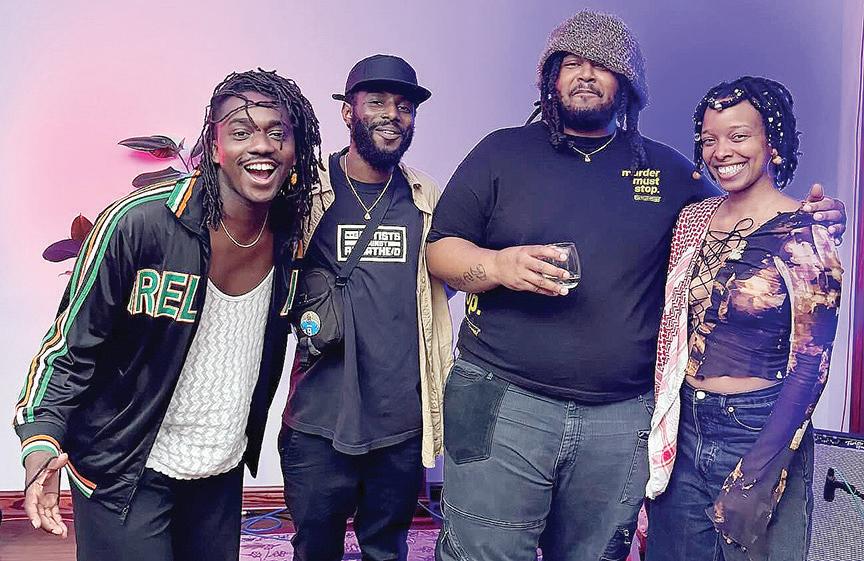
MFnMelo, and Jamila Woods
I believe in,” said South Side Chicago rapper Ric Wilson.
Wilson performed two songs, “Pay It No Mind” and “Fight Like Ida B & Marsha P.” The latter is a frenetic call to
Powered by NoorStudios in partnership with MPower, Dream Defenders, USCPR, and Rising Majority, the two-hour concert featured local talents Jamila Woods, Ric Wilson, Sonny Miles, Amira Jazeera, and more. Nearly 800 people tuned in to watch, according to organizers.
“I do this work because it’s what
And the revolution don’t stop / I am change / Soon we will make a change that will change it all.
“I feel like those songs are what I’m feeling right now; it’s the best way for me
“It means a lot to be a part of the growing chain of voices who are not afraid anymore.” – Sonny Miles
action with shoutouts to Black freedom fighters and lyrics like I am the revolution /
to express myself,” Wilson said.
The lineup of artists was curated in
part by Jamila Woods, who drew from local and national Black, Brown and Arab artistry.
“We have a network of artists who are aligned and want to use their platforms and recognize their role in the power of art, and they’re tapped in. That’s all we can ask for. All we did was ask, and they answered the call,” said Delaney Vandergrift, concert cohost and a national member, political strategist for Dream Defenders, a nonprofit organization dedicated to the abolishment of prisons.
The performances varied from spoken word to rap to ballads, with some artists serenading viewers from the intimacy of their own rooms. An intimate studio audience of fifteen guests created a vibe reminiscent of NPR’s Tiny Desk, but with an added call to action. Not Another Bomb will continue hosting events during the DNC, including a hybrid event on Wednesday, August 21.
“It means a lot to be a part of the growing chain of voices who are not afraid anymore,” said North Carolina musician and singer Sonny Miles.
Sonny Miles’s passion in speaking out against the genocide in Gaza was shared by all the performers. Ric Wilson ended his set with words that resonated with everyone in the room: “From the river to the sea, Palestine will be free.” ¬
Jocelyn Martinez-Rosales is a Mexican American independent journalist from Belmont Cragin who is passionate about covering communities of color with a social justice lens. She’s also the music editor at the Weekly
Photo provided





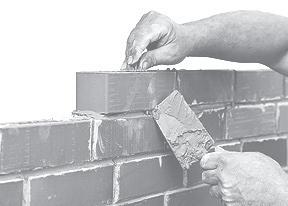







Kamala Harris Closes DNC Following Week of Celebration, Protests and Trump Attacks
The Vice President’s speech focused on her upbringing and stressed unity, but lacked many platform details.
BY MICHAEL LIPTROT
At the pinnacle of the Democratic National Convention’s pageantry on Thursday night, Kamala Harris took the stage to accept her party’s nomination in a thirty-five-minute speech that stressed national unity, support for the middle class, a prosecutorial posture toward her opponent, and a hawkish one on foreign policy.
“On behalf of everyone whose story could only be written in the greatest nation on Earth, I accept your nomination to be president of the United States of America,” Harris told the tens of thousands filling the United Center.
The speech capped off a celebratory week inside the arena that took place amid outcries from thousands of mostly peaceful Pro-Palestinian protesters in the streets surrounding it. At marches and sit-ins, protesters advocated for a ceasefire in Gaza and the inclusion of a Palestinian speaker at the convention. As Democrats celebrated their past successes with an eye towards November, the DNC was laden with direct attacks at former President Donald Trump, but provided little new information about Harris’s platform.
Day four of the DNC, themed “For Our Future,” touched on key Democratic issues that have been featured throughout the week, such as police misconduct, gun violence, and reproductive rights. Rev. Al Sharpton brought four members of “The Central Park Five,” now known as “The Exonerated Five,” to speak on how Donald Trump villainized them from indictment through exoneration, calling for their execution. Gun violence survivors of Sandy Hook, Uvalde and Charleston shootings reflected on their experiences. The “A New American Chapter” conversation included a family’ struggles with reproductive care.
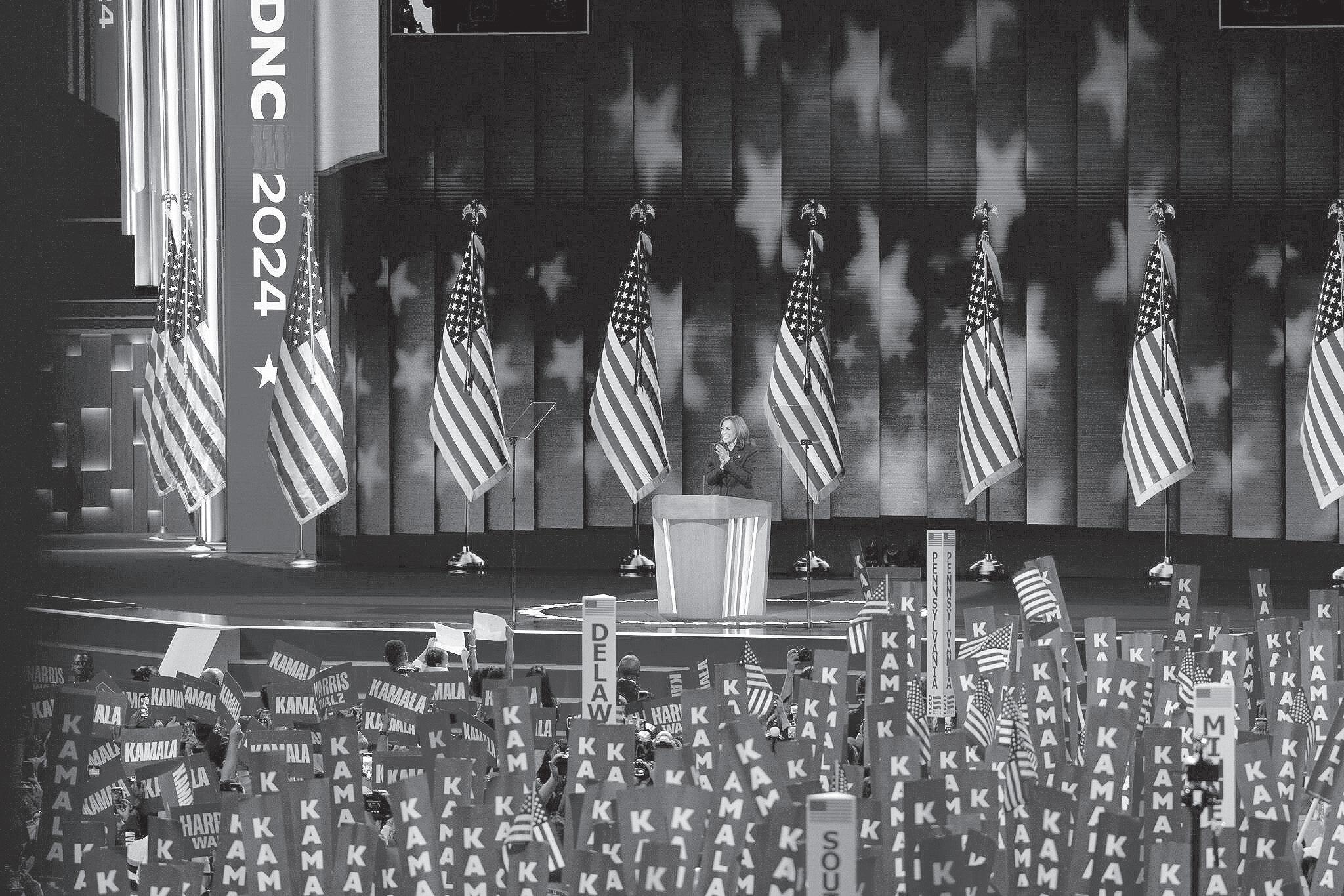
As on previous days, a steady line of politicians of varying seniority delivered remarks. U.S. representative Raja Krishnamoorthi (IL-8),former Illinois Attorney General Lisa Madigan, and former Republican U.S. representative Adam Kinzinger (IL-11) were among local politicians to take the stage Thursday. Harris’s family and friends, including her sister Maya Harris, also delivered remarks ahead of the Vice President’s.
Kamala Harris took the stage at 9:30pm. A video montage introduced the Vice President, praising her upbringing as a “protector” of family and friends and tracing her path as a prosecutor and towards the White House. Beyonce’s “Freedom” closed the video and provided fanfare as Harris took the stage. Wearing a navy blue suit that featured a gold American flag pin, she waved to a sea of supporters clad in white, a symbolic color of the suffrage movement that secured the vote for women 104 years
ago.
Harris opened by acknowledging her husband, First Gentleman Doug Emhoff, and wishing him a happy ten-year wedding anniversary. Then, she acknowledged her two strongest allies as of late: President Joe Biden and her running mate, Minnesota Gov. Tim Walz.
“The path that led me here in recent weeks was no doubt unexpected. But I’m no stranger to unlikely journeys,” Harris said. “So, my mother, our mother, Shyamala Harris, had one of her own.”
Harris continued the introduction by describing her mother’s journey from India to America at nineteen to pursue her dream of being a breast cancer researcher, meeting their father Donald Harris, a Jamaican economist. She recalled her working-class family moving from California to Illinois to Wisconsin and eventually landing in the Bay Area. She credited her mother for teaching her the “do something about it”
attitude that Former First Lady Michelle Obama stressed on the convention’s second day.
“I grew up immersed in the ideals of the civil rights movement,” Harris said, referencing her parents meeting at a civil rights event. This, she says, led her to decide to pursue a career in law. She says her decision to be a prosecutor came from a childhood experience of discovering a close friend, Wanda, was being molested by her stepfather.
“This is one of the reasons I became a prosecutor—to protect people like Wanda, because I believe everyone has a right to safety, to dignity and to justice.”
Harris described “the people” as her client during her career in law, saying “a harm against any one of us is a harm against all of us.” She said the people remained her client as she traced a career from California Attorney General to the Senate and the White House as Vice President.
“On behalf of every American, regardless of party, race, gender or the language your grandmother speaks,” Harris said, she accepted the nomination.
The audience roared.
Harris then pointedly contrasted herself with Trump. “You can always trust me to put country above party and self. To hold sacred America’s fundamental principles, from the rule of law, to free and fair elections, to the peaceful transfer of power,” she said.
After reiterating her prosecutorial experience, Harris put her courtroom demeanor on display as she zeroed in on the former President.
“Donald Trump is an unserious man, but the consequences of putting Donald Trump back in the White House are extremely serious,” she said. “Consider
Photo by Michael Di Gioia
not only the chaos and calamity when he was in office, but also the gravity of what has happened since he lost the last election. Donald Trump tried to throw away your votes. When he failed, he sent an armed mob to the U.S. Capitol, where they assaulted law enforcement officers. Consider what he intends to do if we give him power again.”
Harris said that Trump’s intentions are already laid out in Project 2025, a political policy initiative drawn up by former Trump advisors and the ultra-conservative Heritage Foundation that would radically remake the federal government should he win.
Project 2025’s “sum total is to pull our country back to the past,” Harris said, pausing for effect. “But America, we are not going back!”
After recounting Trump’s attempts to cut Social Security and Medicare, and repeal the Affordable Care Act, Harris described what her administration would pursue. The Vice President, whose campaign began a little more than a month ago, had been criticized by some for not articulating a comprehensive policy platform more quickly. And the 2024 Democratic Party platform that delegates approved on Monday had not been updated after President Joseph Biden withdrew from the race.
She laid out her plan to support the middle class, a policy pitch dubbed the “opportunity economy.” CNBC reported that it would introduce a federal ban on price-gouging groceries, a $6,000 tax credit for newborns, and $25,000 in downpayment support for first-time home buyers. Trump has attacked the plan as “full communist” and referred to the Vice President as “Comrade Kamala.”
“This is personal for me. The middle class is where I come from,” Harris said. “That’s why we will create what I call an ‘opportunity economy,’ where everyone has the chance to compete and a chance to succeed whether you live in a rural area, small town, or big city. And as president, I will bring together labor and workers and small business owners and entrepreneurs and American companies to create jobs, to grow our economy, and to lower the cost of everyday needs like health care and housing and groceries.”
She then turned to foreign policy, highlighting her experience as Vice
President navigating the Russian invasion of Ukraine and Israeli war on Gaza. Last week, the Biden administration approved an additional $20 billion in arms sales to Israel.
Harris said she and Biden were working “around the clock” to get a ceasefire and hostage release.
“And let me be clear. And let me be clear. I will always stand up for Israel’s right to defend itself, and I will always ensure Israel has the ability to defend itself,” she said, referencing the Oct. 7 , 2023 Hamas cross-border attack on Israeli towns that killed over 1,100 Israelis.
“At the same time, what has happened in Gaza over the past ten months is devastating,” Harris continued. “So many innocent lives lost. Desperate, hungry people fleeing for safety, over and over again. The scale of suffering is heartbreaking.
“President Biden and I are working to end this war, such that Israel is secure, the hostages are released, the suffering in Gaza ends and the Palestinian people can realize their right to dignity, security, freedom and self-determination.”
Harris concluded with a call to action that was steeped in patriotism.
“We are the heirs to the greatest democracy in the history of the world,” she said. “And on behalf of our children and our grandchildren and all those who sacrificed so dearly for our freedom and liberty, we must be worthy of this moment.”
She called on viewers to “do what generations before us have done,” and “to fight for this country we love.”
“Let’s get out there, let’s vote for it, and together, let us write the next great chapter in the most extraordinary story ever told,” she said. “Thank you. God bless you, and may God bless the United States of America. Thank you.”
As thousands of red, white, and blue balloons fell from the ceiling of the United Center, Harris was embraced by her husband before they were joined by Walz, his wife Gwen Walz and their families.
“Freedom” blared again from speakers, and this time Beyonce’s lyrics were nearly drowned out by the thundering crowd. ¬
Michael Liptrot is a staff writer for the Weekly and the Hyde Park Herald
Forty Years of ‘Democrats for Palestine’ Continues to Confront Familiar Repression
In 1984,
James Zogby referenced Israeli
“occupation” for the first time on a convention stage. Treatment of the issue at DNC 2024 leaves lifelong Democrats re-evaluating their strategy for Palestinian liberation.
BY WENDY WEI
For four hours last Tuesday, Mark Jagner, sixty-two, bent over a journal in his lap and scribbled notes in the conference room of Rainbow PUSH Coalition Headquarters on 930 East 50th Street in Kenwood. The black-and-white fishnet pattern of a keffiyeh hung around his neck like a scarf, cascading down to twin slogans on both ends—“Democrats for Palestine.” To his left and right, a few others donned bright yellow t-shirts on the back of which, capitalized without decoration, was the bare demand—“END WEAPONS TO ISRAEL NOW.”
One participant among dozens, Jagner had driven down from Ann Arbor, Michigan to attend the three-day conference held from August 19-21 titled “Heeding the Voices for Justice: A Convention to Build Power,” convened by the Arab American Institute, Progressive Democrats of America, Rainbow PUSH Coalition, and (for Tuesday’s programming) the Institute for Middle East Understanding Policy Project.
The event examined the merits of keeping entwined two identities becoming more and more disparate— being a Democrat and being a supporter of Palestinian liberation. Over the course of six panels, delegates, coalition partners, and community members heard from prominent advocates who have worked within the Democratic party for over half a century to recently elected and former officials to policy analysts. They provided perspectives on what progress has been made, what is possible for the future, and what structural constraints stand in the way of the ultimate goal which is long-lasting peace in Palestine.
For nearly a year since October 7 when Hamas militants killed 1,200 people and took some 250 hostages, the Biden administration has ensured that Israel was armed with billions of dollars worth of military equipment to carry out its lethal strikes against Palestinians in the Gaza Strip, while also delivering
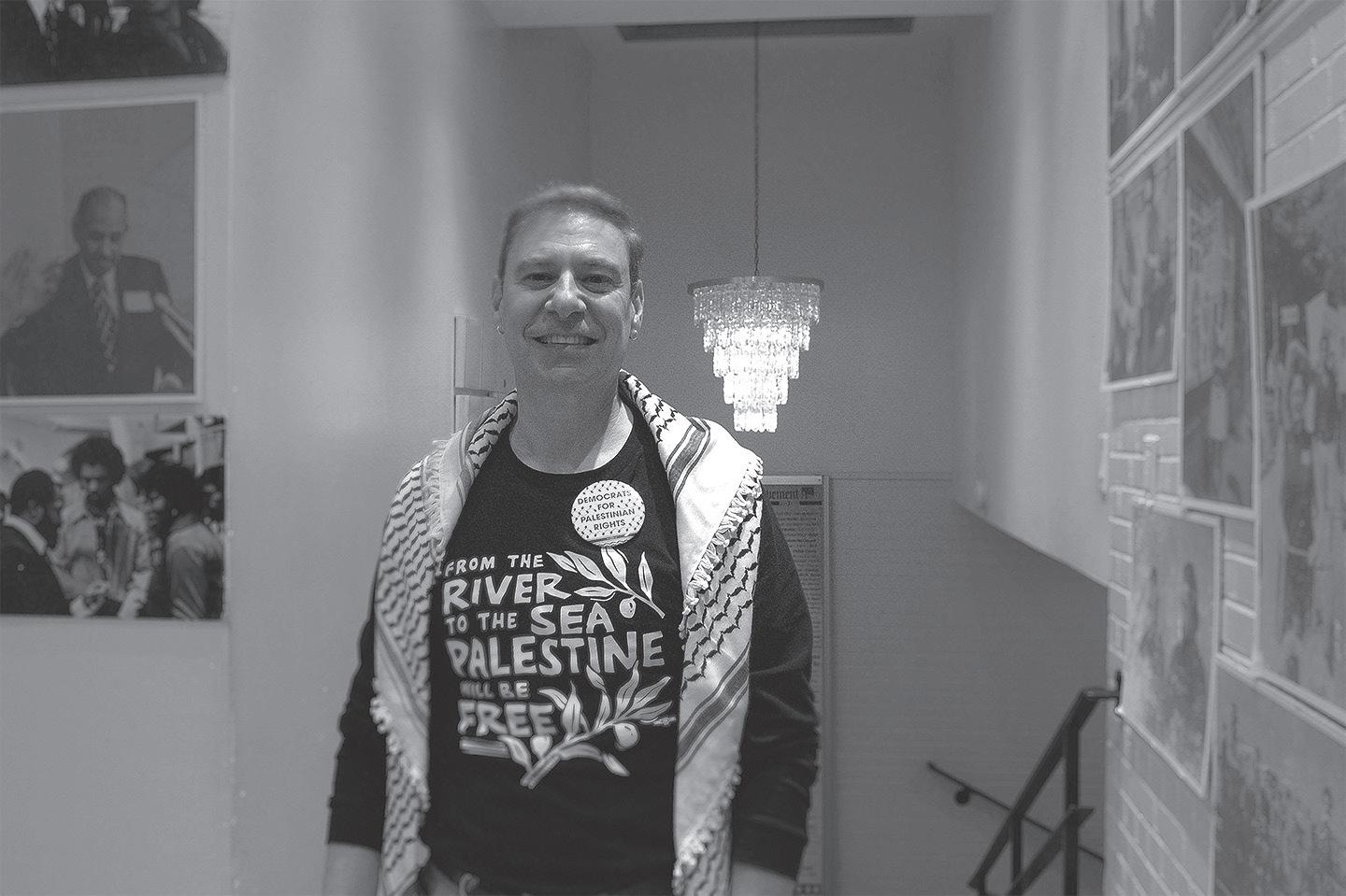
a growing constituency, are confused and frustrated by the contradictory actions of Democratic leaders. Some, including lifelong Democrats, are wondering if they have a future with the party.
For those who want to address these concerns head on, “Heeding the Voices for Justice” was a welcome alternative gathering to the Democratic National Convention. The event’s focus on homegrown strategies for long-term peace in Palestine is what drew folks like Jagner, who has been active in mobilizing his local community to support Palestinian liberation for over a decade. He currently serves as the chapter lead for the Ann Arbor congregation of the Unitarian Universalists for Justice in the Middle East.
A lack of reliable information on Israel and Palestine initially drove Jagner to learn more about the conflict.
“I didn’t feel I had the whole story when I would read the newspapers or watch the evening news about what the situation was in Israel Palestine,” he said.
Eventually, Jagner found satisfying answers from a documentary he saw at his church depicting Palestinians in the West Bank fighting against the border wall’s encroachment on their land. In his hunt for more information, he eventually took a trip to Israel and the West Bank in 2019 with Eyewitness Palestine, an educational travel program led by Palestinians in Palestine.
“One of the things that really made
Jofhis seventy-nine years of life to advocating for Palestinian rights.
As founder of Arab American Institute (AAI), one of the main conveners of “Heeding the Voices for Justice,” Zogby sent out the invitation a month before the DNC with the prescient words, “These voices may not be on the DNC stage but they won’t be silenced.”
Few Democrats, if any, have had the long career Zogby has forged in advocating for Palestinian rights to be elevated to a national platform. For thirty years, he has been a member of the DNC, serving
has led to him experiencing death threats while falling on deaf ears in the Democratic Party. In many ways, the pattern continues today; young pro-Palestine organizers have been doxxed, had job offers rescinded and diplomas withheld, and been arrested en masse, while the requests of uncommitted delegates for the DNC to feature a Palestinian speaker went unheard.
The first day kicked off with programming on the environment of suppression of pro-Palestine voices through dark money and free speech policies, a thread that carried through to the last day’s conversations on party transparency.
Last Wednesday, Matt Duss, who was Bernie Sanders’ foreign policy advisor from 2017 to 2022, said he was disappointed in the closed “completely elite-driven process” this year that was a departure from conventions past.
As the incumbent president, President Biden did not participate in a primary debate this campaign, a move that mirrors every incumbent president since the first debate was held in 1948. But without a primary, Duss says there is little ability for progressives to press the party in the traditional way.
“This is the party that’s telling us there’s a binary choice, and voting Democrat is how you save democracy,” but when policy debates are happening behind closed doors and there is no appropriate pushback, that’s “what has to change,” said Maya Berry, executive director of AAI.
dispute towards Biden’s platform that Biden’s team “smartly agreed” to have task forces on every issue (notably except the Middle East, Duss recalls). Over the course of eleven televised debates, twenty-three presidential candidates, including Sanders, Elizabeth Warren, Pete Buttigeg, and Biden, hashed out policy stances in front of a national audience.
Duss argues that this format was key to eventually producing a party platform that also reflected Sanders’ approach to health care, the death penalty, and other issues, even though he did not win the nomination.
“We have this bizarre situation where you have this…massive slap dash document that is not even written for the candidate,” Duss said, referring to the current Democratic platform that was written and ratified for Biden in July before he dropped out, without an opportunity for Harris to reopen the process.
“There should have been at least some effort to put her stamp on that,” Duss said. As he looks ahead to 2028, he is concerned with “how do we get a bottom up process that creates leverage that can get in the kind of language and statement of policy and values that we want?”
Last Monday, the DNC delegates approved the party platform for Harris.
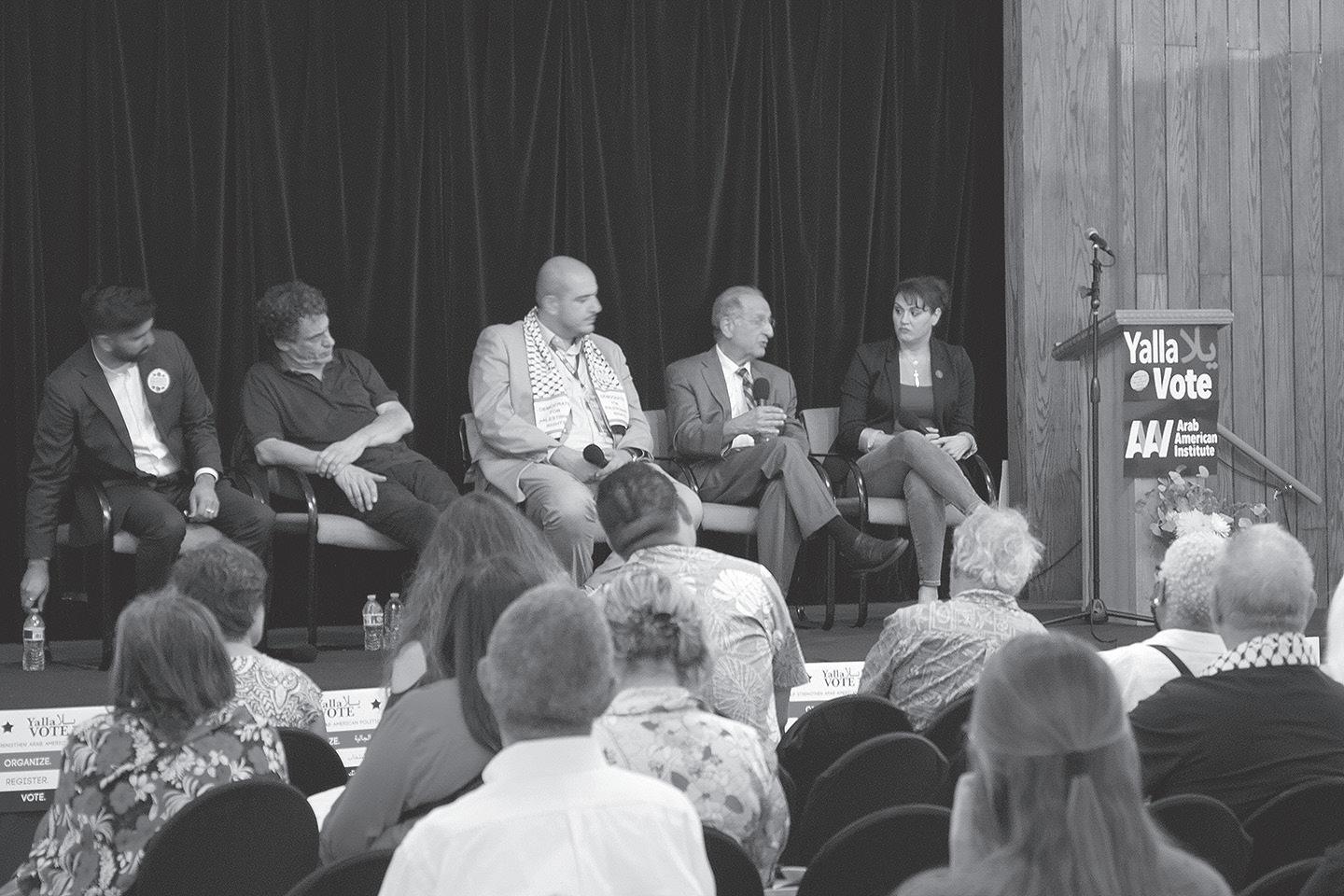
Duss recalled that when primaries were held in 2020 to pick the Democratic presidential nominee, it created an environment in which there was enough
On Israel, the Democratic platform supports Jerusalem to “remain the capital of Israel” and states that the Democrats “oppose any effort to unfairly single out and delegitimize Israel,” including the Boycott, Divestment, and Sanctions Movement, and at the United Nations.
On the same panel, Berry argued that party platforms should not be read as binding policy proposals, but rather as a document that “reflects the political pressure that’s applied by different interest groups” instead of US foreign policy.
“The process of the platform is about the politics, not the substance,” she said. “They know that.”
During open mic time for audience questions following a discussion on progress, one person, originally from East Jerusalem, expressed their disappointment at the Democratic Party’s lack of acknowledgement of the worsening genocide in Gaza.
“We have this progress that we’re talking about, but in real life, the conditions
Mark Jagner Photo by Wendy Wei
(From left) Waleed Shahid, Alan Minsky, Abbas Alawieh, James Zogby, and Rania Batrice leading a panel last Wednesday titled “Palestine and Its Impact on Progressive Politics".
Photo by Wendy Wei
have been getting progressively worse,“ they said. “To be honest, I came here looking for hope, and at first, I was very encouraged, but…”
Zogby interrupted her saying, “I’m going to give you hope, okay?”
He first confirmed that her concern is valid, that “this is genocide. There’s no question.”
“Nothing’s going to bring back those 40,000 or more, many more probably, who’ve died,” he said. “But what we can do is recognize that we have actually seen an awakening of conscience that we’ve not seen in all the years. This is genocide...and now we’re finally seeing people wake up. And I don’t think it’s going to go back, and I don’t think you put the lid back on this issue.”
He thanked the largely youth-led grassroots movement in relentlessly organizing and changing public opinion, while pointing to its diversity across race, gender, and nationality—something that wasn’t the case fifty years ago when the block in Washington “was just about fifty Palestinians and me. (Zogby is LebaneseAmerican) Older guys. What we saw in the last year are demonstrations of literally hundreds of thousands.”
Another panelist Rania Batrice, a Palestinian-American Democratic operative for over twenty years, was more frank. “No, a shift in rhetoric is not everything. A shift in rhetoric does not save lives.,” Batrice said. “It is a welcome change and it is an open door for the shift in policy. And what I’m asking [Harris’] team to do, it’s very simple. Follow our own damn laws.”
Batrice may have been referencing the Leahy Laws, which prevent the U.S. from sending assistance to foreign governments credibly accused of gross human rights violations. Despite findings from the U.N. that Israeli forces have violated human rights, the U.S. government continues to send military aid to Israel and disputes the U.N. reports.
One specific break in US policy from the rest of its peers internationally is funding to UNRWA, to which “Heeding the Voices” dedicated an entire panel to discuss last Tuesday.
Before October 7, the United Nations Relief and Works Agency for Palestine
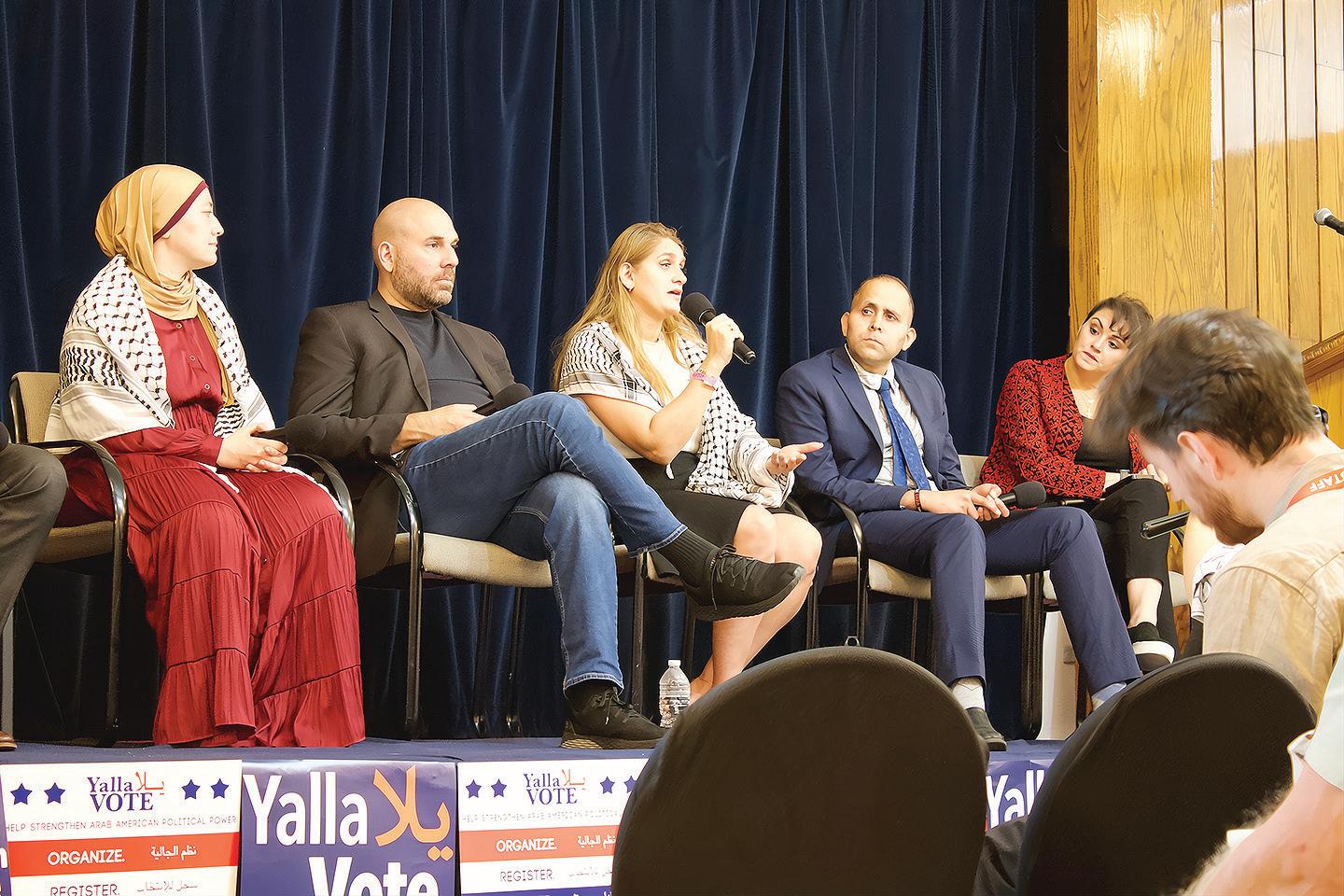
dialogue with people who do not agree with her views. “I definitely believe the first part…would be to really educate myself so that I have dialogue with people which are not full of anger and frustration and like ‘how can you not be worried about this?’ she said.
Co-founder of the Uncommitted National Movement Layla Elabed (center) spoke last Tuesday, on a panel titled “Palestinians Voices That Must Be Heard at the Party Conventions alongside (from left) Georgia state representative Ruwa Romman, Omar Baddar, Hani Almadhoun, and Rania Batrice.
Refugees (UNRWA) served over 60 percent of the population of Gaza, providing food, healthcare, education, and infrastructure. The United States was UNRWA's biggest donor, providing $300-$400 million a
one in Gaza, for every person that dies, the fallout from the aftermath of military campaigns will kill two or three more, said Zaha Hassan, a Palestinian human rights lawyer and political analyst.
“No, a shift in rhetoric is not everything. A shift in rhetoric does not save lives. It is a welcome change and it is an open door for the shift in policy. And what I’m asking [Harris’] team to do, it’s very simple. Follow our own damn laws.” – Rania Batrice
year, or about a third of the organization’s budget.
After Israel alleged in January that 12 of UNRWA’s 13,000 employees were involved in the Hamas attack in October, and claimed up to 10 percent of UNRWA staff were linked to Hamas, the United States and several other countries paused funding. A U.N. internal investigation found Israeli accusations were not credible, an April report read.
“The work of UNRWA is under threat,” Mara Kronenfeld, executive director of UNRWA USA, told the Weekly. “There are all sorts of unfounded accusations about UNRWA, and they’re really meant to disable an organization that is keeping Palestinians alive.”
Ensuring long term healthcare access in the Gaza strip is essential because research shows that in conflicts like the
“So we have 40,000 Palestinians dead, so we know that double that, or triple that number, will die. That’s even if we had a cease fire tomorrow,” said Hassan.
US funding to UNRWA remains frozen until at least March 25, 2025, despite the fact that all other countries who had halted funding have resumed.
Shama Patel, sixty, of Streeterville, considers herself “newly awakened” to the Israel/Palestine conflict. Not to say Patel was new to the issue, but the world that unfolded after October 7 motivated her to learn more intentionally about the issue and engage.
As an incoming teacher at New York University on digital technologies driving social change, Patel resonated with the event’s focus on the importance of continuous education, and how to have
She knows it is a steep, uphill battle, but has had enough conversations to notice common pushback with the same questions. “The pro-Israeli agenda is so embedded in the American language lexicon,” she said. “I think there are very good answers for that. My first thing would be to really get some stock answers so that I can respond to that, so we can get over that.”
Elected Democrats are also committed to continuing the conversation with their peers in Congress. Ruwa Romman is a Palestinian-American Georgia state representative and was one of the people on the list the Uncommitted delegates gave to the DNC to consider as a speaker. Even prior to October 7, she had invested much time in educating fellow congressmen on Palestine.
“A lot of people don't have the vocabulary, knowledge and understanding of how far reaching this issue is in every level of government,” she said as a panelist. “And I spoke to them, I explained it to them.”
Zogby concurred, adding that from his experience on the hill he learned that “you have to have a rapport, and people have to like you” in order to open minds to meaningful conversation on Palestine. “Too often, we take our issue and we go and
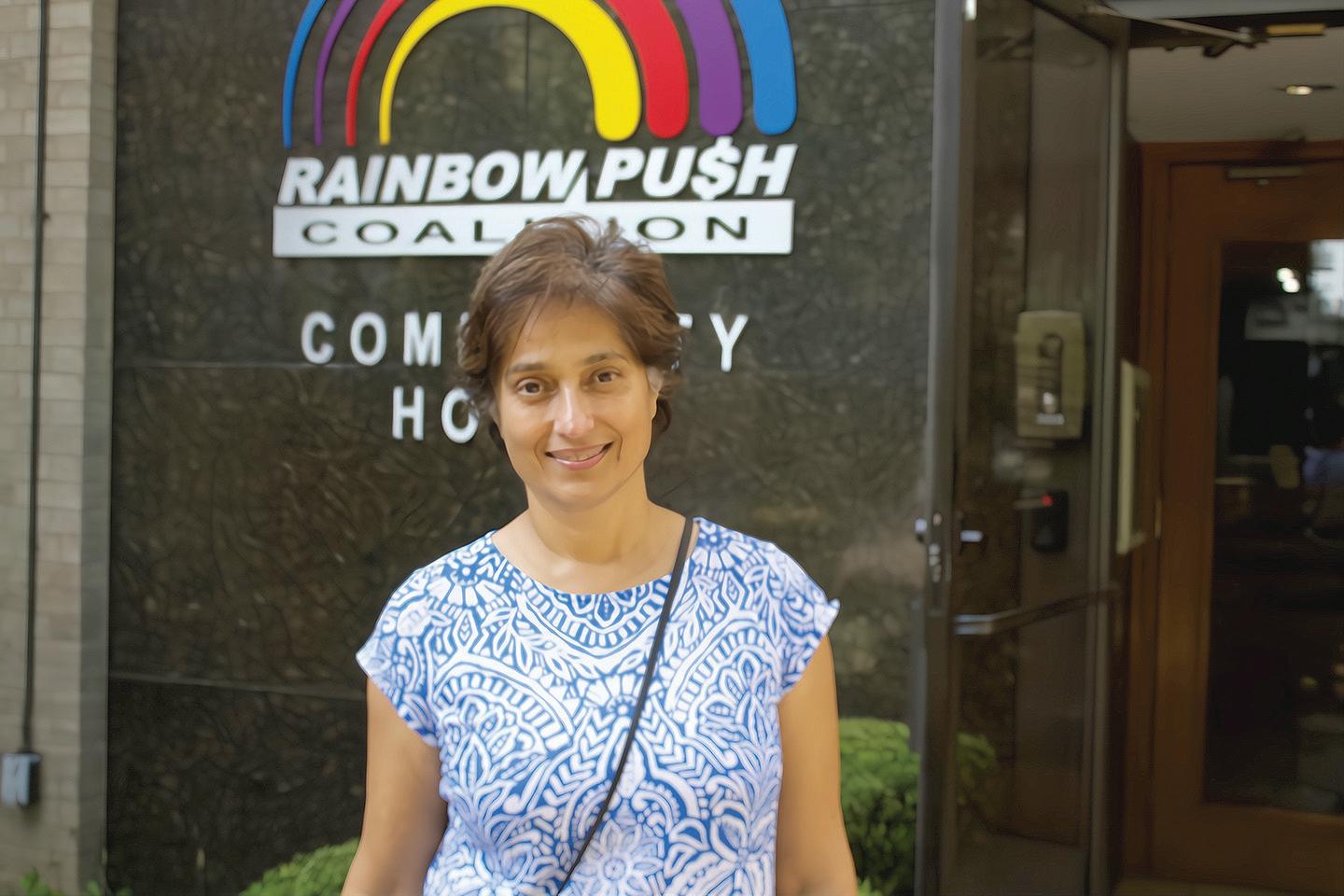
Photo by Wendy Wei
Shama Patel
Photo by Wendy Wei
Zogby, who said that he first testified in front of Biden in 1976 and has known him for “a number of years,” did not hold back his criticism, calling Biden a “neoconservative Democrat” who has been ideologically locked in for decades without “a new idea in his head.” Zogby described his talks with Biden on the Middle East as “onesided” arguments against someone who is fixated on the idea of America as the benevolent superpower that must defeat foreign evil.
“I call him a secularized version of Christian fundamentalism. It’s like good versus evil and the ultimate battle has to be waged, etcetera,” Zogby said. “That’s where he comes from.”
In referencing personal conversations with Harris, Zogby notes differences between her approach and Biden’s in talking with different stakeholders about Israel’s actions. “She puts her ear to the ground and reads the room,” he said, referencing a meeting with her after she publicly stated in December 2023 that Israel must do more to protect the lives of innocent Palestinians.
“I’d never heard anybody in office do that….saying [about Israel] ‘you have the right to defend yourself, but how you do it matters.’”
For Patel, Biden’s actions in the public arena signaled a lack of respect for her vote and support as a Democrat, and a troubling sign of unchecked power. “When he went to Israel and hugged Netanyahu, I saw that and I was completely outraged by it,” she said. “I empathize with them, but I do not believe that Israel is the 51st state of the United States. I don’t believe that the contributions I make should go unquestionably for the kind of support that Biden has been giving Israel.”
Though she recognized Biden had made efforts to change his stance, it was too little too late.
“He literally had to be pushed into it, and I was like you’ve got to go,” Patel said. “It’s time for somebody else.”
“You’re not going to get the Vice President to break with her boss in a public way, and she can’t,” Zogby said. But still he sees “an indication of the corner being turned” in Harris’ approach to handling foreign policy, ultimately because “[Biden] never read the room. I think that’s the difference.”
Duss pushed back on Zogby’s characterization of Biden, stating that there are issues that the President has shifted on because he was made to shift by the progressive movement. Duss is focused on “build[ing] that muscle within the party” to pressure Democrats in charge.
Harris’ ability to “read the room” was put to the test during the week of the DNC, when uncommitted delegates were denied an opportunity to speak from the main stage. As the week rolled from Tuesday to Wednesday to the final day on Thursday, the DNC found time to feature Republicans, former Trump press secretaries, credit card company ex-CEOs, and family members of Israeli hostages—but no PalestinianAmericans. Outside the United Center, dozens of uncommitted delegates and other supporters staged a sit-in instead.
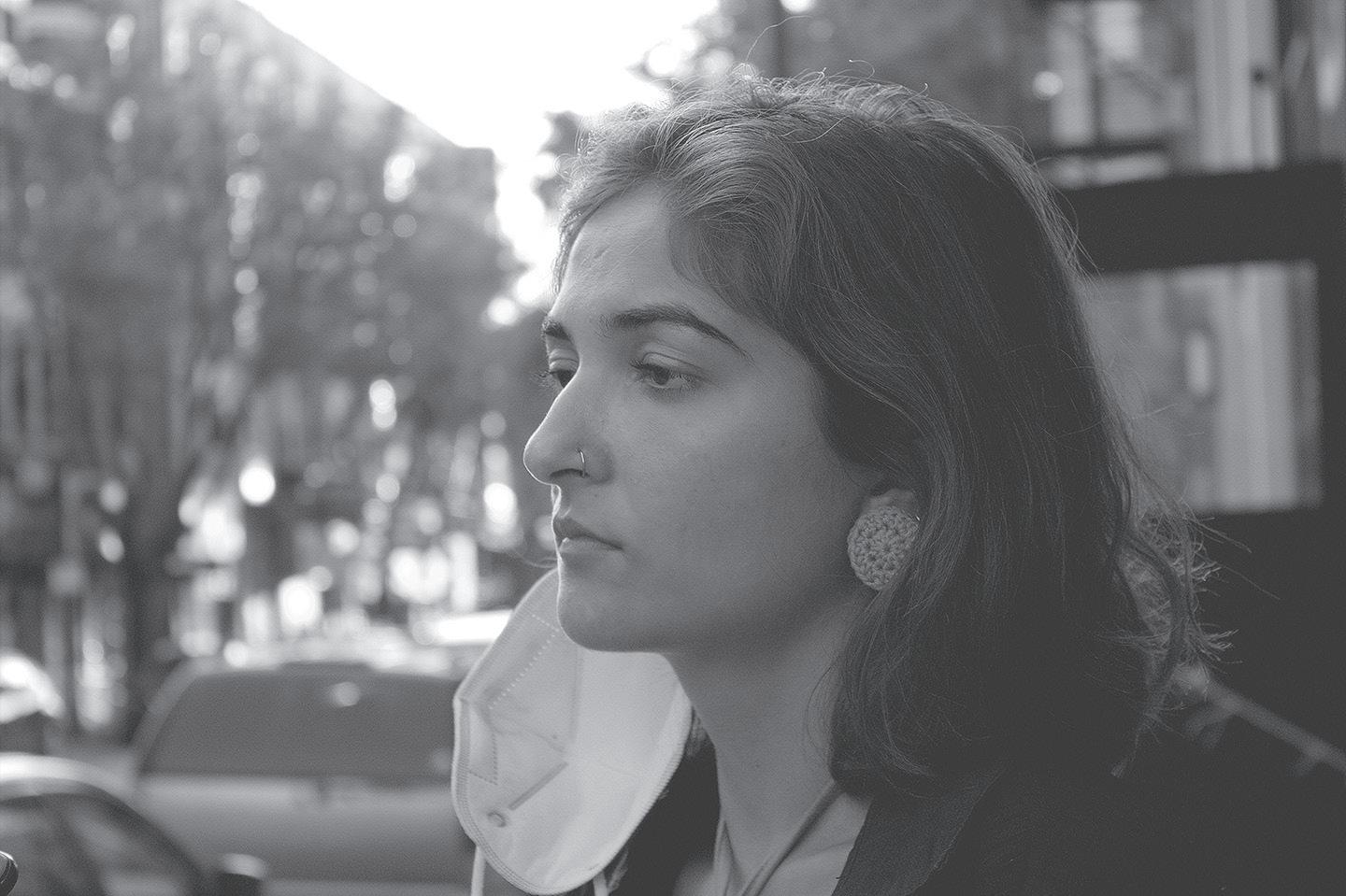
Democratic party.
For some Democrats, pushing Harris to do better on Israel is not only compatible with voting for her, but a crucial exercise in keeping elected officials accountable that must be sustained.
“There are a lot of people that want us to believe that there’s nothing that's going to change [but] it is changing..and now is a time for us to lean in,” said Romman, adding that it is crucial for the ceasefire coalition to protect the coalition through and past November.
Jagner believes that voting for Kamala while simultaneously criticizing her platform is important and are not mutually exclusive. “We need to keep put[ting] pressure on her and on Joe Biden to change US policy on Israel-Palestine.”
He specifically wants political power pushing for an arms embargo and resuming humanitarian aid to Gaza.
Like Jagner, Patel remains critical of Kamala Harris’ position on Palestine and Gaza. She voted uncommitted for Biden in the primaries, and though for now she plans to vote for Harris in the general election, she caveats it with “unless, of course, something happens between now and November where she completely alienates me.”
This year, she wants to hold the Democratic party to be more accountable to their commitment to Palestinian lives. “She needs to demonstrate more than what I have seen.”
Some voters do not think it’s worth their time to continue engaging with the
“We have no reason to believe that the Democratic Party will actually do anything for the Palestinian people… Their whole platform has just been talking about how they’re not Trump,” said Maheen, an organizer with Chicago Dissenters, to The Weekly outside a “F*ck the GNC” event held at Pilsen Community Books on healthcare in Gaza .
Maheen conceded that voting in the election and building community power can exist side by side, even though it’s not her personal priority to work with the Democratic party. “We don’t need their events. We don’t need their spectacle… because we’re building together outside of these political systems,” she said.
She is focusing her energy in building connections and support networks in her local community, and “find[ing] other ways to take care of one another, because neither party cares about the people.”
The audience refrain that echoed throughout the week of speeches was “We won’t go back!”, capturing the message the Democrats unified under for the 2024 DNC, that of a party for progress towards unity, freedom, and opportunity for all Americans.
In many ways, Harris’ de facto slogan points to the reality that progress isn’t always linear.
The word “occupation” to refer to Israel’s presence in Palestinian territories doesn’t come up in the 2024 platform or stage, nor was it in 2020. But Zogby pointed out it did make an appearance in 1988.
Thirty-six years ago from the DNC
main stage in Atlanta, Zogby introduced Jesse Jackson’s minority plank position on Palestine for open policy debate. Multiple people were standing on the floor, holding signs reading “Palestine Statehood Now!” in green, black and red swirling into the Palestinian flag.
“We’ve won a victory today. The deadly silence that has submerged the issue of Palestinian rights has been shattered,” Zogby said, facing the crowd.
He would have seen in the audience a banner five feet tall and spanning over a dozen seats that read “SELF DETERMINATION AND STATEHOOD FOR THE PALESTINIAN PEOPLE.” A cluster of green signs read “MIDDLE EAST PEACE: Palestine Statehood, Israel Peace.” No delegate tore these signs or tried to cover them up. No security escorted them out.
Last week, the few signs brought by Palestine supporters were torn down by their peers in the stands. C-SPAN did not capture them on their livestream, and ultimately, no Arab-American was allowed on stage to share their views. Outside, protestors at the sit-in and across several marches brought their own. The larger crowd echoed what Zogby stated in the very first mention of Palestinian rights at a national convention forty years ago:
“Some, even leaders in this Party, have sought to write us out,” he said in 1984. “But our concerns are American concerns. Our agenda is the nation’s agenda. And so we will remain.” ¬
Wendy Wei is the Weekly’s immigration editor and focuses on interracial solidarity among communities of color.
Maheen
Photo by Jordan Esparza-Kelley
DNC Counter-Convention Amplifies Voices of Resistance
“F*** The GNC” is centering the pro-Palestine movement with a week of programming and urgent calls for action.
BY JOCELYN MARTINEZ-ROSALES
Afew miles away from the Democratic National Convention (DNC), a coalition of actionists gathered all week for panels and workshops in solidarity with Gaza. “F*** the Genocidal National Convention,” a counter-convention organized by Chicago Dissenters, held events across the city, offering a stark contrast to the Democratic Party’s pageantry. In rooms filled with keffiyeh-clad organizers, the counter-convention has created space and opportunities for people to strategize, learn, and be in community.
“We need to provide the alternatives that we want people to attend,” said Jordan Esparza Kelley, a Chicago Dissenter and Weekly freelancer. “If we are not the ones providing the alternatives for people to indulge in, then all we are is complainers about what people are doing. So I want us to provide the media. I want us to provide the space. I want us to provide the education.”
The free counter-convention kicked off its week of programming the weekend before the DNC, featuring events such as “DJs Against Apartheid,” a book and zine fair, art installations, and panels on topics including “cop cities,” labor organizing, healthcare in Gaza, and prison abolition.
Ashley De La Torre, who DJs under the moniker Mo Mami, was on the DJs Against Apartheid panel. The Pilsen DJ is the creator of Fever Dream Worldwide, which hosts a monthly dance party centered around creating inclusive nightlife spaces. “We were able to reflect, brainstorm and share personal experiences on our respective missions to create liberation through music and dance,” she said.
The events were hosted in four locations, Pilsen Community Books, CoProsperity in Bridgeport, Grace Place in the South Loop and Podlasie Club in
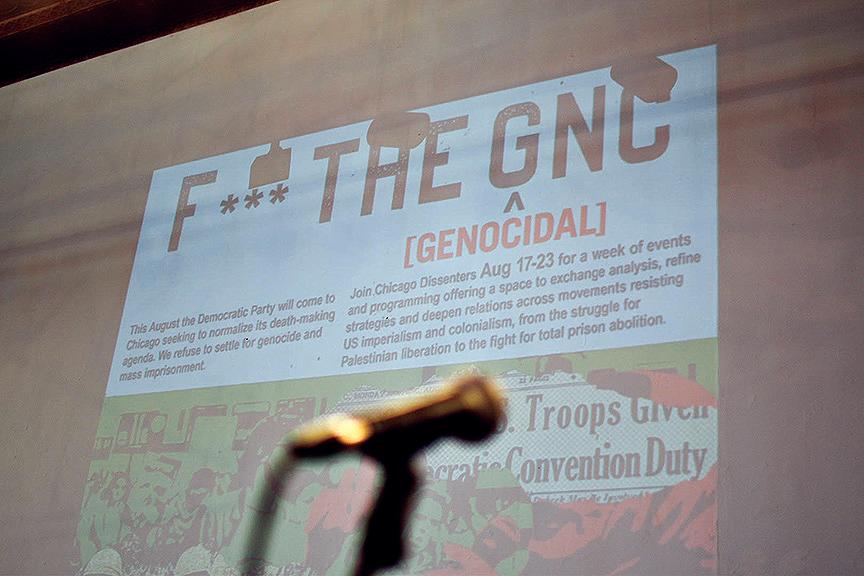
Logan Square. (Masks are required to prevent airborne disease transmission.)
“The spaces that we're hosting these events at are spaces where they have been very allied, and have hosted a lot of events for the pro-Palestine movement,” said Maheen, a Chicago Dissenter who declined to give their last name.
“Everything is free here. We got snacks, we got coffee; we tried our best to provide everything, and we also have strict masking guidelines, because right now, Chicago is experiencing a summer COVID surge,” Esparza Kelley said.
People traveled from across the country to attend the counter-convention, with attendees coming from states such as Georgia, California, Indiana, Texas, and New York. Several panels are live-streamed, and Esparza Kelley has anchored Lumpen Radio from 4 to 5 p.m. each day of the convention. On the airwaves, he interviews panelists and organizers, and provides recaps of each day's events.
While the panels are focused on different movements and social actions, there is a common thread that weaves them together: resistance.
“What we're talking about is getting back to those roots and standing from a place of strength [and] of remembering that we have always been in resistance with each other, but now we have the tools to actually be deeper in relationship with one another,” said Janene Yazzie, a panelist and the director of policy and advocacy for NDN Collective, an organization dedicated to promoting Indigenous power.
Yazzie traveled from New Mexico to participate in Tuesday's “Stop Cop Cities” panel. “The solidarity that we’re talking about is not something that’s just sprouting out as a new tactic,” she said. “It’s something that has been woven into the creation of this country.” She emphasized the importance of recognizing Indigenous organizing as a crucial part of the broader liberation movement, breaking the erasure
that often surrounds it.
The “Stop Cop City” panel explored how that movement, which began in Atlanta, has spread to other cities. It concluded with words from Joel Paez. Paez’s son, Manuel Esteban Paez Terán, who went by the activist moniker Tortuguita, was a twenty-six-year-old Indigenous queer environmentalist who was fatally shot by Georgia State Patrol Troopers during a raid on the Stop Cop City encampment outside Atlanta in 2023. Paez’s words moved attendees to tears as he ended with a call to action in honor of his late son.
Esparza Kelley said that the fear police brutality has instilled in disenfranchised communities was only heightened in 2020, and has deterred people from supporting movement actions. On the second night of the DNC, about seventy demonstrators were arrested during a pro-Palestine march outside the Israeli consulate. According to the Chicago chapter of the National Lawyers Guild, whose members are monitoring the demonstrations, at least two protesters were hospitalized after being arrested.
“What people experienced on the street was a very real thing, and it is scary. Even I, myself, was intimidated. I had never faced police repression like that,” Esparza Kelley said. “I think that's what our counterconference programming has become: it’s just this sanctuary of people who still are down, still want to be involved, but cannot really bear the police brutality.” ¬
Jocelyn Martinez-Rosales is a Mexican American independent journalist from Belmont Cragin who is passionate about covering communities of color with a social justice lens. She’s also the music editor at the Weekly
Photo provided





